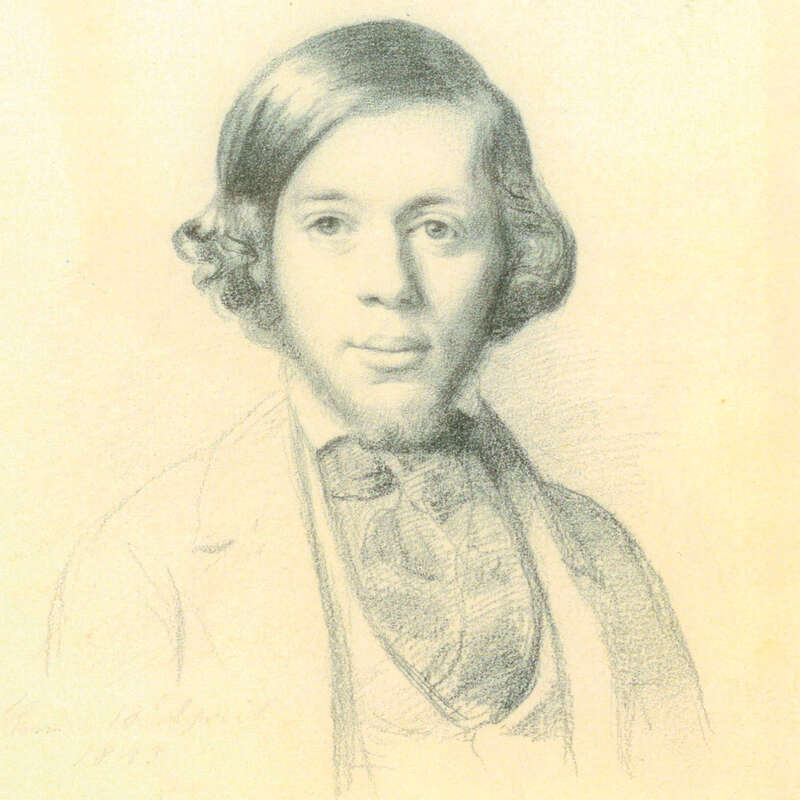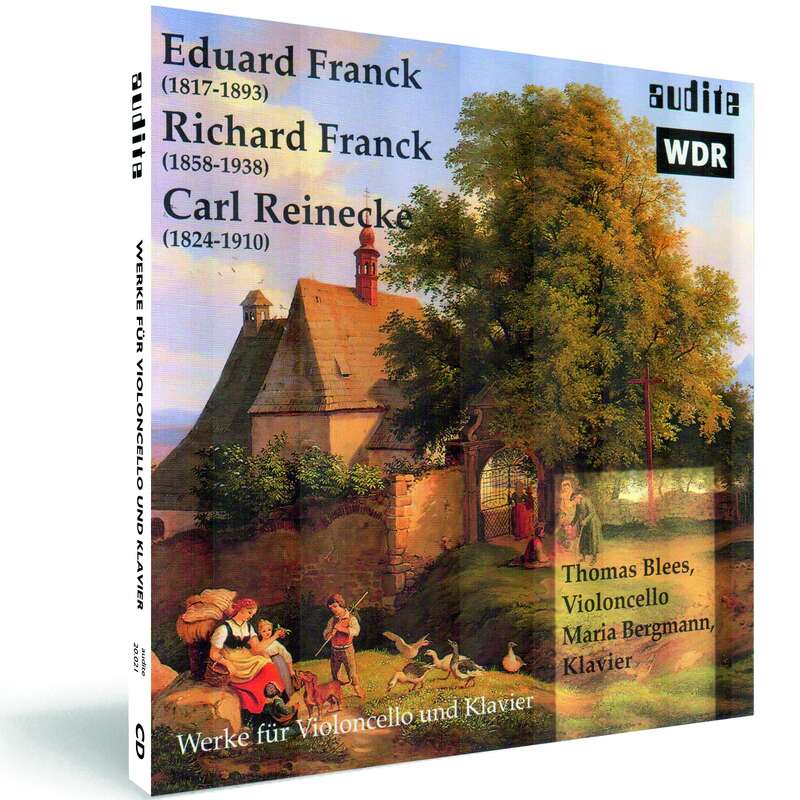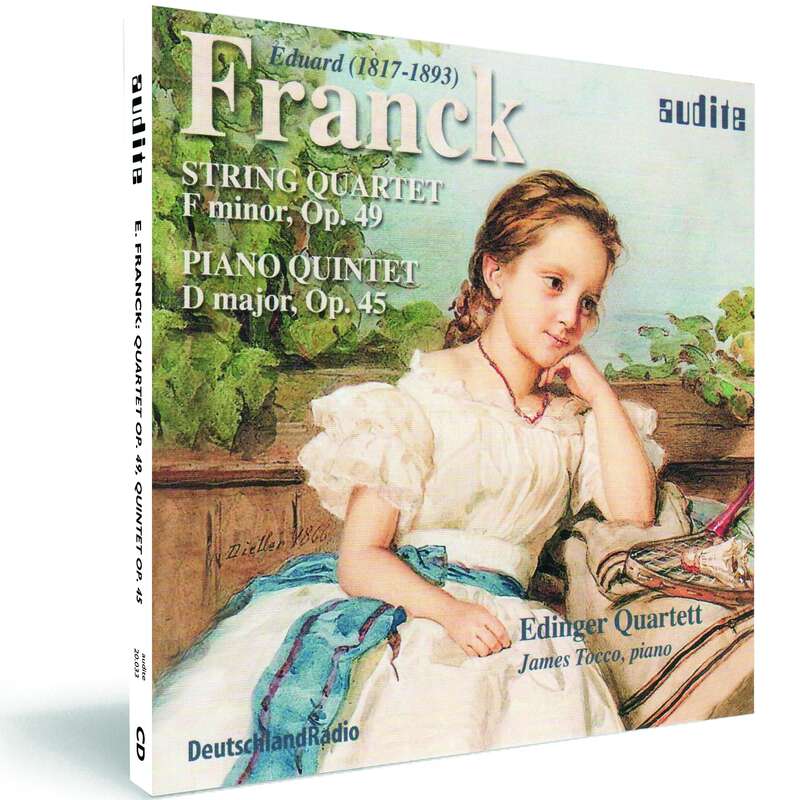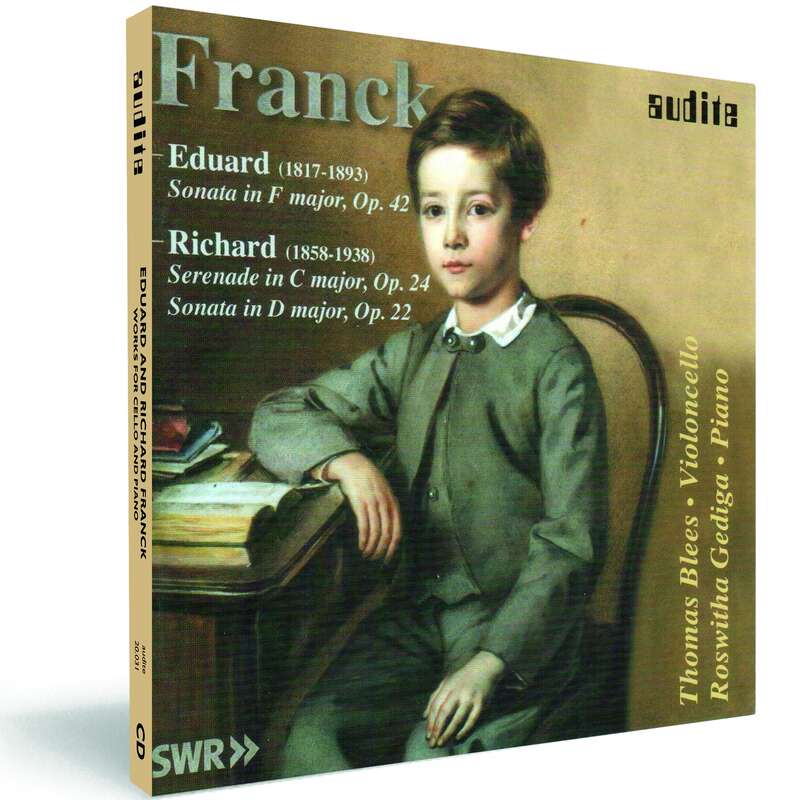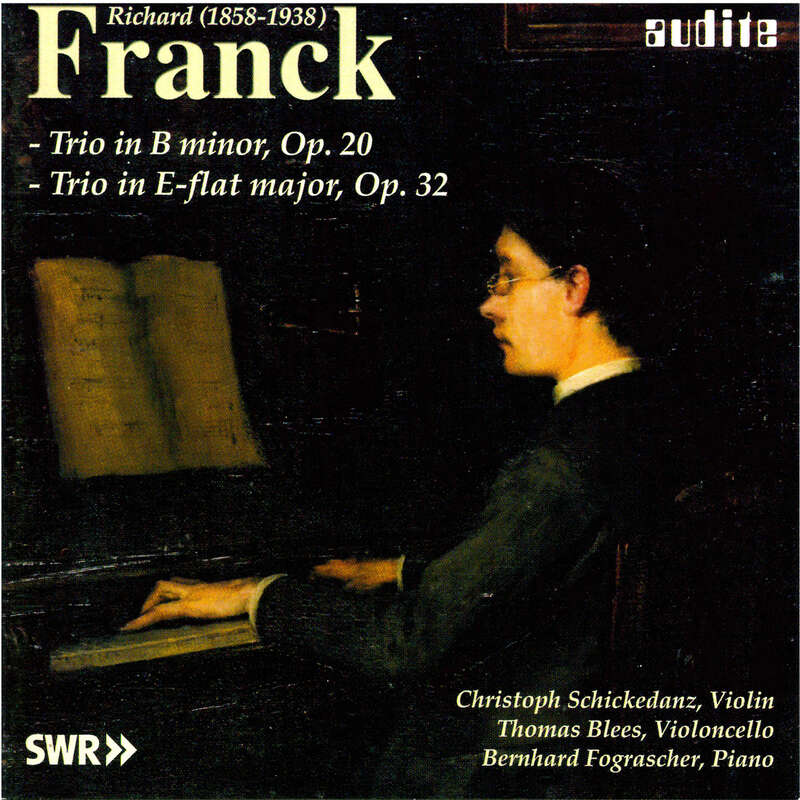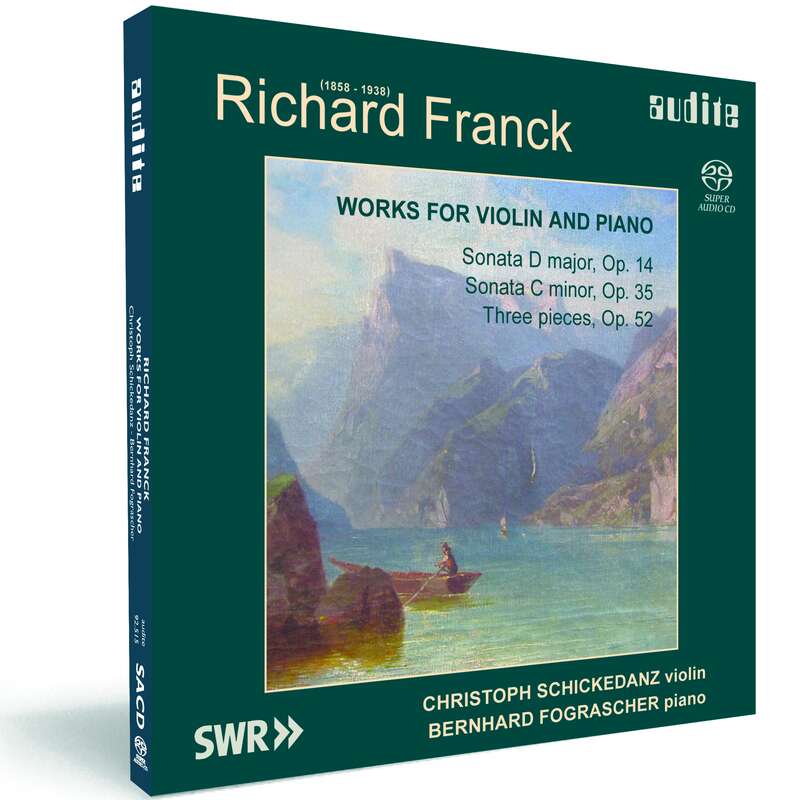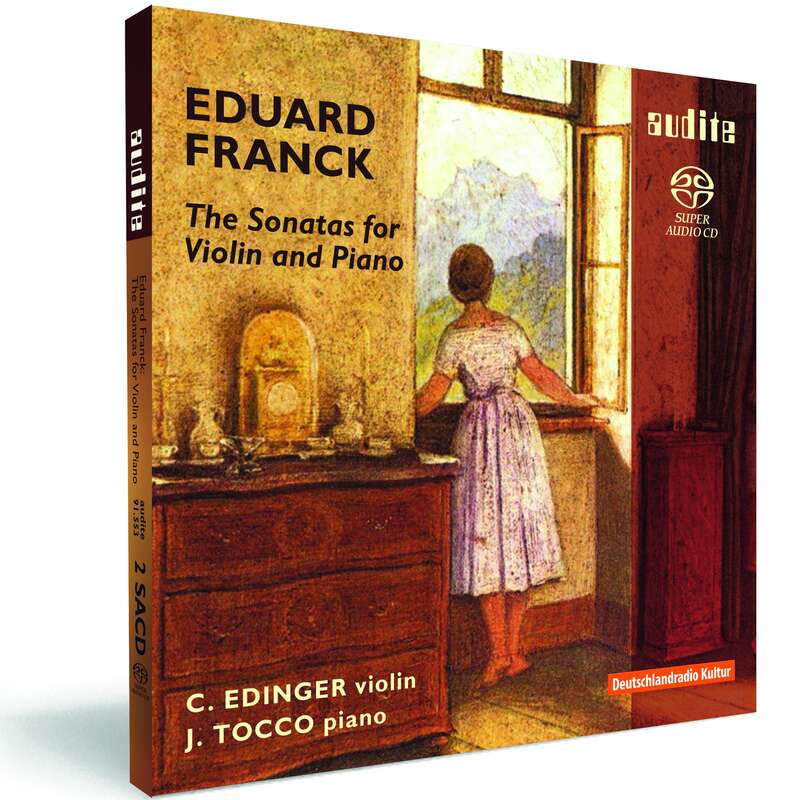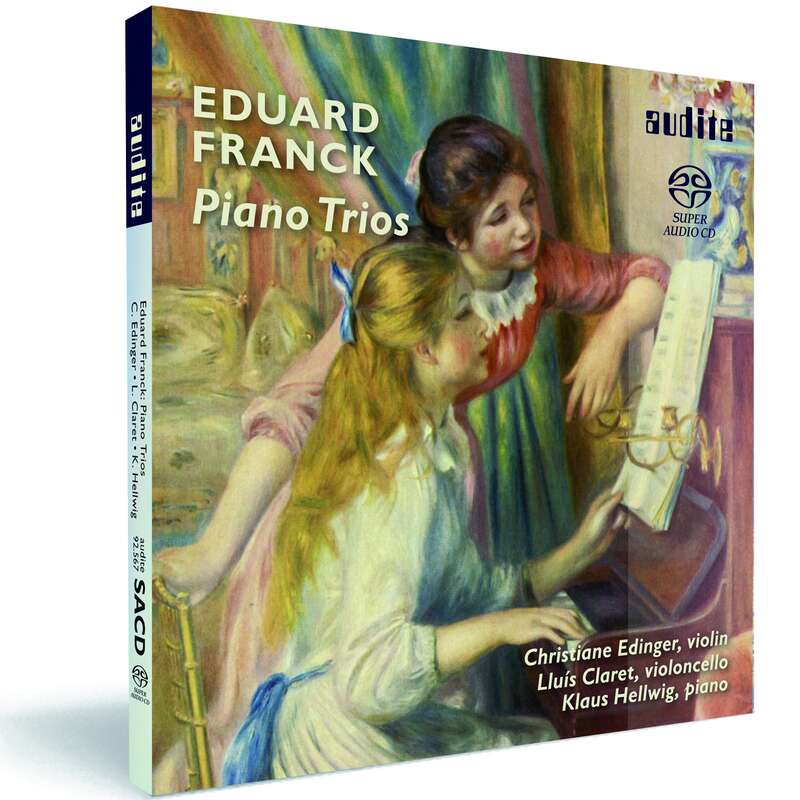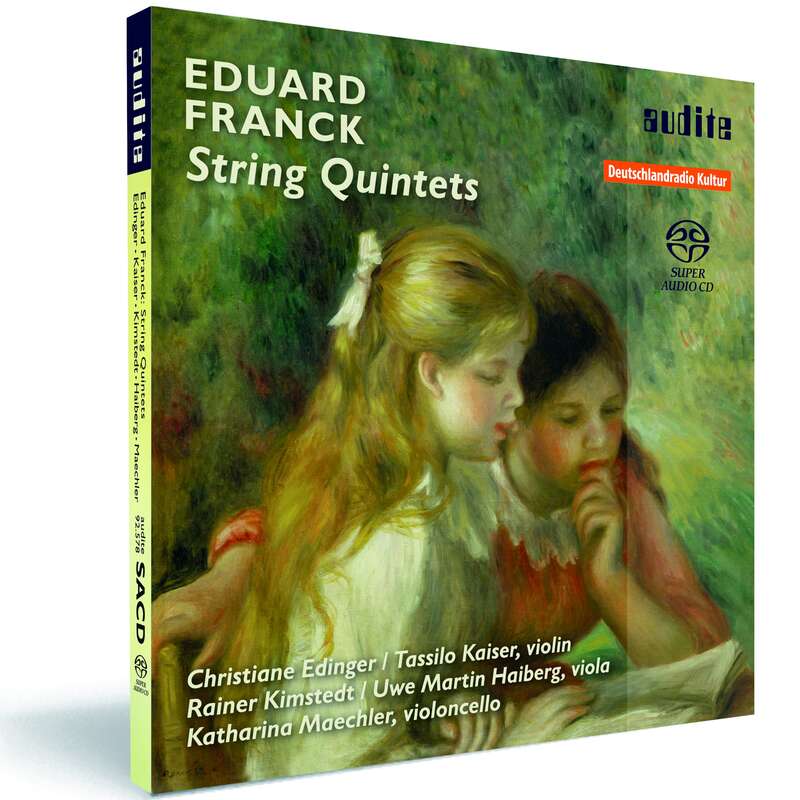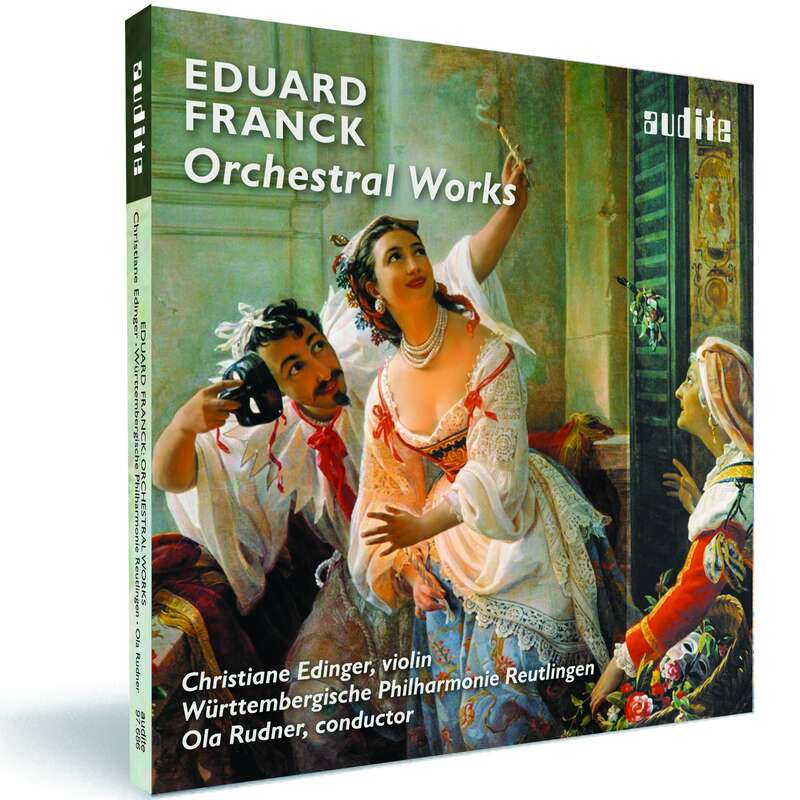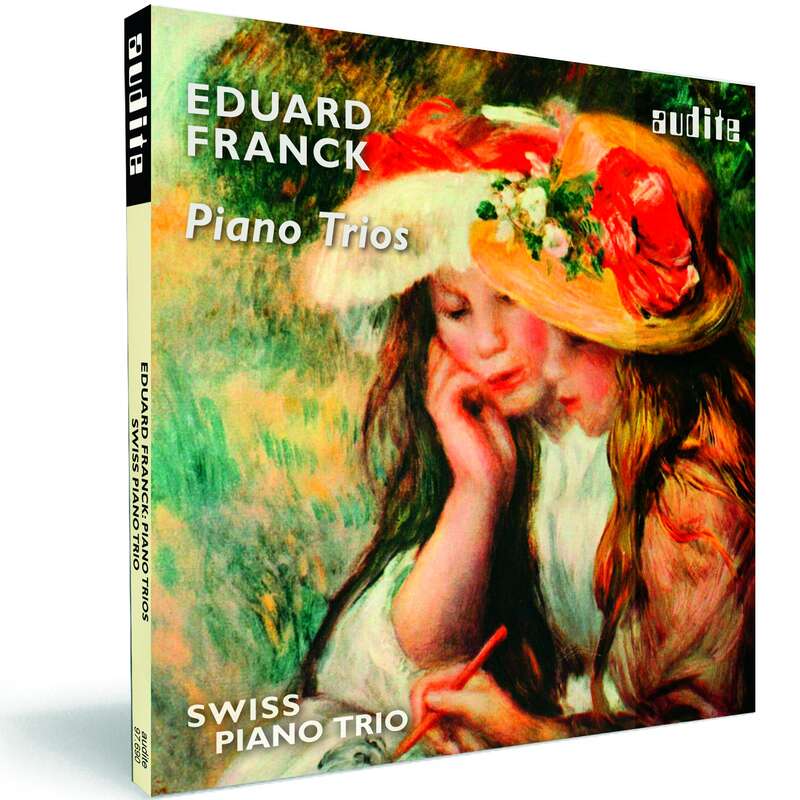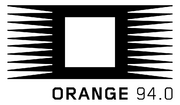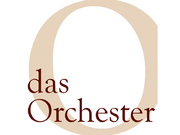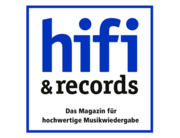Bei dieser 10-teiligen Serie handelt es sich um eine Wiederentdeckung der Komponisten Eduard und Richard Franck. Sowohl Vater Eduard, der Schüler Felix Mendelssohn Bartholdys und ein enger Freund Robert Schumanns war, als auch sein Sohn Richard waren zu Lebzeiten gefeierte Pianisten undmehr
Katharina Maechler | Tassilo Kaiser | Christiane Edinger | Rainer Kimstedt | Uwe Martin Haiberg | Ola Rudner
"gefällige, anmutige Werke - für Cellisten sicher eine Bereicherung. Thomas Blees [...] und Maria Bergmann musizieren sehr spritzig, mit viel Temperament und Spielfreude." (HR)
Titelliste
Multimedia
-
PDSK-Longlist 2_2014
Preis der Deutschen Schallplattenkritik: Nominierungen für Bestenliste 2/2014
Informationen
Bei dieser 10-teiligen Serie handelt es sich um eine Wiederentdeckung der Komponisten Eduard und Richard Franck. Sowohl Vater Eduard, der Schüler Felix Mendelssohn Bartholdys und ein enger Freund Robert Schumanns war, als auch sein Sohn Richard waren zu Lebzeiten gefeierte Pianisten und Komponisten. Unverkennbar spiegeln sich in ihren Werken die Einflüsse des berühmten Lehrers und auch Freundes, doch im Gegensatz zu den Werken Mendelssohn Bartholdys büßten ihre Kompositionen im Fortgang der Geschichte jegliches öffentliche Interesse und damit auch den Eingang in den Werkkanon tradierter Musikliteratur ein. Somit handelt es sich bei dieser audite-Serie, die sich den verschiedenen Werkgruppen – angefangen von verschiedenen kammermusikalischen Besetzungen bis hin zu Orchesterwerken – widmet, ausnahmslos um Ersteinspielungen.
Besprechungen
www.amazon.de | 5. April 2017 | 5. April 2017 | Quelle: https://www.amaz... Great New Swiss Players
This is a rare recording of the German Frank by a superb Swiss Trio. I have never heard these trios before and recommend them as delightful to hearMehr lesen
Image Hifi | I/2015 | Heinz Gelking | 1. Januar 2015 Früchte der Arbeit
Das Schweizer Klaviertrio hat jetzt drei davon auf hohem Niveau eingespielt. Streicher und Klavier stehen in schöner Balance, das Musizieren hat Energie, Transparenz und Homogenität – hörenswerte Werke in einer Top-Erstaufnahme.Mehr lesen
Orange 94.0
| Klassik um 3, Samstag 27.12.2014, 15:00 - 16:00 Uhr | 27. Dezember 2014
BROADCAST
Violine: einsam & gemeinsam - Violin-Soli, Kammermusik und Orchestermusik mit Violine
Sendebeleg siehe PDF!Mehr lesen
Muzyka21 | listopad 2014 | Stanisław Lubliński | 1. November 2014
Wydawnictwo Audite kontynuuje serie płytową poświeconą niemieckiemuMehr lesen
Neue Musikzeitung | 9/14 September 2014 | 1. September 2014
Romantische Grenzgänge zwischen Konzert und Salon
Übersehene Kleinode der Klaviertrioliteratur in neuen Aufnahmen
Die CD mit dem Schweizer Klaviertrio ergänzt die verdienstvolle Franck-Serie bei audite um eine weitere Facette – und dies auf vorbildlichem instrumentalen und klangtechnischen Niveau.Mehr lesen
American Record Guide | September 2014 | Gil French | 1. September 2014
Audite is doing a great service by bringing us another album (the 10th) devoted to the music of little-known German composer Eduard FranckMehr lesen
These three works cover most of Franck’s life as a composer. True, the early work is not profound and sounds more like early Mendelssohn (his teacher), yet it’s very satisfying musically. Even at the age of 18, Franck really had a feel for making each of the instruments interesting as they intertwine.
While Franck’s writing is certainly more mature in the two later trios, his overall style did not change much in 51 years. While he writes splendid sonata-allegro movements, his development sections are less contrapuntal than imitative, each instrument repeating or modulating what another has just played. Perhaps this is one reason why his music is not convoluted like Brahms’s can be; Franck’s textures are always transparent, which is such a delight because my ears were consistently tuned to each instrument. No one plays mere filler for more than four measures; I was constantly held in a state of anticipation.
Also, all three works are in major keys, another reason this music is so consistently sunny. In Opus 22 the Scherzo is as inventive and fresh as Schubert or Mendelssohn at their best, especially given the bright, light, upbeat, and uplifted phrasing of violinist Angela Golubeva, cellist Sebastien Singer, and pianist Martin Lucas Staub. They also make the Andante con Moto most soulful and the final Allegro Molto Vivace absolutely foot-tapping. All of these qualities are typical of their playing in all three works.
In Opus 53, as in the others, the players’ wonderful grasp of form translates into joyous forward motion that can still linger at certain points without impeding the progress. They also give full voice to Franck’s splendid gift for melody and lyricism. Also, they adapt their style to each movement: the waltz-scherzo-like II, the tender Andante, and the fleet final Allegro con Fuoco. In all works, I must admit that, while I’m normally critical of players who have little tone color, it’s a “failure” I forgive here because of their extremely wide palette of expression, especially their manner of shaping phrases.
The only other limitation here is the engineering. Balances are superb, including the piano’s full range from firm bass to treble. But the ambience is what happens all too often when ensembles like this are recorded in a church (Temple du Bas in Neuchatel, Switzerland). A kind of hollow aura results, leaving the players somewhat distant. I wish they sounded a degree more present so that the violin wasn’t so consistently thin and the ensemble as a whole without a rich dramatic depth. Franck’s music has it, and I’m sure the players themselves do. I love the album; I just wish that the full experience weren’t locked behind a pastel curtain.
Musik & Theater | 9/10-2014 | Sibylle Schäfer | 1. September 2014 Statt Pralinen
Diese herrlichen Klaviertrios werden in jeder CD-Sammlung brillieren, denn es handelt sich hier durchwegs um meisterhaft gearbeitete Kompositionen, die vor Ideenreichtum und Melodienseligkeit nur so überquellen. Vor allem Opus 22 – das einzige Trio, das zu Lebzeiten des Komponisten gedruckt wurde – braucht den Vergleich mit den besten Werken der Gattung nicht zu scheuen. Man verzeiht es den Interpreten gern, dass sie die Trios auf eine Weise spielen, die niemandem weh tut.Mehr lesen
Fanfare | 19.08.2014 | Jerry Dubins | 19. August 2014
By now, readers should be somewhat familiar with Eduard Franck (1817–1893), following half-a-dozen or so appearances he has made here on recordingsMehr lesen
This latest release, containing three of Eduard’s piano trios, holds no surprises if you’ve already acquainted yourself with one or another previous Eduard Franck release, but like those that have preceded it, this disc of piano trios does hold in store just as many musical felicities.
I use the word “felicity” with intent; for Eduard studied privately with the “Felix” of Mendelssohn fame, and mostly Mendelssohn is what you get with these three trios. It’s really hard to describe how brimming over this music is with sheer contentment in untroubled, joyful song. The nonstop rippling piano parts are shot through with Mendelssohn’s nimble keyboard work, and even Franck’s melodies are consistently constructed from intervals and phrases that are dead ringers for Mendelssohn’s melodic invention. If you find Felix’s two piano trios irresistible, you will be thrilled to know that Eduard Franck composed at least four piano trios just like them.
In fact, this is Audite’s second volume of Franck’s piano trios. The first (92567), on SACD, contained the trios in E Minor, op. 11, and D Major, op. 58, performed by a different ensemble of players than the Swiss Piano Trio on the current disc, which, for some reason, did not come to me on SACD. Also, be aware that if you purchased the Naxos CD containing Franck’s sonatas for cello and violin, plus the E♭-Major Piano Trio I recommended in 36:5, the trio is duplicated on this Audite disc. No matter, though; it’s worth the one duplication to get the two additional trios included on the present CD.
This is now my third or fourth encounter with the Swiss Piano Trio on record, and each one has elicited from me the highest praise. The ensemble’s recent Audite release on SACD of Clara Schumann’s Piano Trio led me to declare the Swiss Piano Trio one of the top ensembles on today’s stage in 36:6; and in a 35:1 review of Robert Schumann’s piano trios, Steven Ritter declared the Swiss Piano Trio’s Audite SACD an essential recording.
It seems only fitting that the Swiss Piano Trio, having already committed Mendelssohn’s two piano trios to disc on another Audite SACD—to which I gave an urgent recommendation in 34: 6—should now turn its attention to Mendelssohn’s musical Doppelgänger, Eduard Franck. You cannot love 19th-century piano trios in general, and Mendelssohn’s piano trios in particular, and not love these trios by Franck. Considering Franck’s dates, the skewing of his catalog towards chamber works (though he did pen symphonies and orchestral scores), and his strong leaning towards a Mendelssohnian style, he bears comparison, I think, to his very close “French-though-I-prefer-to-be-German” contemporary, Theodor Gouvy (1819–1898).
I just don’t understand why previous Audite releases have been SACDs and this one isn’t. Perhaps there is a parallel SACD version, and I just happened to receive the standard two-channel stereo CD one. Anyway, with the music, performances, and recording being so beguiling, it would be churlish of me to complain. This is a must-buy recommendation.
International Record Review | July / August 2014 | Mark Tanner | 1. Juli 2014
The piano trio emrged as one o f the more important genres in the nineteenth century, from amidst an ever-complex, ever-volatile, ever-vibrant periodMehr lesen
Aged 17, Eduard Franck (1817-93) was a pupil and disciple of Mendelssohn, and during his three Iessons per week Mendelssohn appears to have given Franck the courage and social mobility to move in circles inhabited by the likes of Hiller, Joachim, Chopin, Brahms and Schumann, though his reputation as pianist would somewhat overshadow his accomplishments as composer, at least for the time being. Interestingly, though Franck apparently never aligned himself with the so-called 'New German' circle, populated conspicuously by Liszt and Wagner, nor did he overtly trumpet the cause of the thoroughly grounded Germanic tradition, it is perhaps due to occupying something of a diplomatic middle ground that he would eventually garner the resources to carve an important niche for himself as a composer.
Besides occupying a stalwart position within a vibrant cultural scene, Franck was able to weave in his considerable expertise as pianist into a handful of superb piano trios, which, according to Sebastian Bolz, author of the detailed notes for this new Swiss Piano Trio recording for Audite, may possibly contain one other in addition to the five already known. These exploit the piano's ability to generate intensiy and drama, while at the same time drawing out plenty of excitement from the violin and cello parts. Bolz suggests that Franck's treatment of these instruments is directly indebted to his formative time under Mendelssohn's wing. (My review of the Swiss Trio in May 2011, also for Audite, was indeed the Mendelssohn Trios, in which I praised some 'fiery and effervescent' playing). Over a period of just over 50 years Franck would pen piano trios of appreciable distinction, and yet two of those featuring on this recording are premieres: the E major of 1835 and the D major, Op. 53, of 1886. This disc, which rounds off the Swiss Piano Trio’s project to record all of the piano trios, also holds the E flat major, Op. 22, of 1859.
What strikes me most about the music overall is its affable buoyancy and willingness to move around freely within the blueprint of four strategically positioned movements. While each work contains a racy finale and a thoughtful Andante, only two have scherzos, the E major exhibiting a youthful exuberance and no-holds-barred approach to the Romantic piano part. The players attack this earliest work with decisive, uncompromising tempos, and the sense of enthusiasm is especially palpable in the concluding Presto, where the tight-knit playing comes across as amply spontaneous and ebullient. In the E flat Piano Trio, the longest and perhaps most intriguing of the three due to its sprawling opening movement, Allegro moderato con espressione, there is playing of especial vibrancy and a thoroughly absorbing communication between the players. Notable too are the cheeky Scherzo to the E major and the doleful, heartfelt Andante to the D major, where each instrument claims its territory in a beautifully empathetic way.
Recorded last year at the Temple du Bas in Switzerland, the sound is as sympathetic to the expressive movements as it is to the faster-moving music, and the one or two quibbles I raised about the balance of instruments in relation to the aforementioned Mendelssohn disc are entirely not the case in this splendidly charismatic SACD. It marks the conclusion of an impressive Eduard Franck celebration consisting of a dozen releases from Audite embracing orchestral works, string sextets, quintets and quartets, as well as music for cello and piano.
Fono Forum | Juli 2014 | C. Vr. | 1. Juli 2014 Ausdrucksstark
Dass Eduard Franck Unterricht bei Felix Mendelssohn bekommen hat, hört man zumindest dem E-Dur-Klaviertrio von 1835 durchweg an. Da sind perlendeMehr lesen
ionarts.blogspot.com | Saturday, June 28, 2014 | jfl | 28. Juni 2014 Musical Sunshine
Eduard Franck (ditto his son Richard) is an ingenious chamber music composer whose output has been championed by the Audite label and Franck-veteranMehr lesen
www.expeditionaudio.com | Jun 24, 2014 | Paul Ballyk | 24. Juni 2014
The remarkable Swiss Piano Trio performs with the impeccable technique, sensitive musicality and homogeneity of sound and approach that set them among the finest such ensembles performing today.Mehr lesen
Ensemble - Magazin für Kammermusik | 3-2014 (Juni/Juli) | Carsten Dürer | 1. Juni 2014 Aus Mendelssohns Schatten
Das Schweizer Klaviertrio spielt dieses Werk entsprechend mit Vehemenz, jugendlichem Charme und einer wunderbaren Melodienlust [...] auch mit einer neuen Klanggebung und einer Transparenz, die jedwede Nuance hörbar macht.<br /> [...] Insgesamt ist diese CD ein Erlebnis und das Klaviertrio aus der Schweiz zeigt wieder einmal seine Klasse.Mehr lesen
[...] Insgesamt ist diese CD ein Erlebnis und das Klaviertrio aus der Schweiz zeigt wieder einmal seine Klasse.
www.klavier.de
| 20.05.2014 | Florian Schreiner | 20. Mai 2014
Quer durchs 19. Jahrhundert
Franck, Eduard: Klaviertrios
Der hohe Wert dieser Franck-Produktion liegt also nicht nur darin, dass die Kenntnis des Klaviertrio-Repertoires im 19. Jahrhundert erweitert wird, sondern dass die Werke als eigenständige Beiträge von großem Reiz sind – und von Schweizer Klaviertrio schlichtweg erstklassig präsentiert werden. Und schließlich lassen weder Beiheft noch klangliche Darstellung Wünsche unerfüllt.Mehr lesen
klassik.com | 20.05.2014 | Florian Schreiner | 20. Mai 2014 | Quelle: http://magazin.k... Quer durchs 19. Jahrhundert
Der hohe Wert dieser Franck-Produktion liegt also nicht nur darin, dass die Kenntnis des Klaviertrio-Repertoires im 19. Jahrhundert erweitert wird, sondern dass die Werke als eigenständige Beiträge von großem Reiz sind – und von Schweizer Klaviertrio schlichtweg erstklassig präsentiert werden. Und schließlich lassen weder Beiheft noch klangliche Darstellung Wünsche unerfüllt.Mehr lesen
??? | 01.05.2014 | Livio Malpighi | 1. Mai 2014
EduardF ranck era un compositore di origine tedesca( nato a Breslavia) da non confondere con il più noto César Franck, ottimo compositore belga cheMehr lesen
Il suo continuo ricercare la perfezione formale lo portò alla pubblicazione di poche opera che risultano di livello veramente molto alto dal punto di vista compositivo. In questo disco troviamo tre dei suoi trii: quello in E-major del 1835, quello in Es-Dur Op. 22 e quello in D-major Op. 53(questi ultimdi due qui proposti sono in prima registrazione mondiale). Lo Swiss Trio compost da Angela Golubeva al violino, Sebastien Singer al cello e Martin Lucas Staub al piano eseguono con grande affiatamento e comunione di intenti questo difficile repertorio. Questi trii, indubbiamente figli della scuola di Mendelssohn ma con una vena romantic un poco più spinta, sono certamente di non facile esecuzione. Non parlo solo della tecnica esecutiva ma anche dell'interpretazione che richiede la capacità di dipanare un filo logico musicale con frasi molto lunghe che si susseguono senza interruzioni. Questi trii hanno una notevole somiglianza con le composizioni di Brahms, così come il concetto d'interpretazione musicale potrebbe estendersi ad un altro autore molto interessante come Thuille che con il suo Sestetto per pianoforte e fiati, che per certi versi si può accomunare come stile compositivo a Franck, ha creato un'opera di eccezionale livello dalla difficile interpretazione musicale. La caratteristica di questi trii di Eduard Franck sono la cantabilità e la grande maturità musicale, sono opera veramente belle che poco o nulla hanno da invidiare ai capolavori dei grandi maestri dell'ottocento. L'esecuzione poi dello Swiss Trio è fresca, molto matura, tecnicamente molto efficace, in grado di mettere in mostra un fraseggio classico, trasparente e dal romanticismo evidente ma non strillato. Un gran bel disco!
Registrazione nativa 24/96 fatta con i giusti presupposti sonori. La dinamica è ottima anche se non amplissima. Probabilmente qesto deriva anche dagli interpreti che non arrivano mai al triplo forte né tanto meno al pianissimissimo. L’avessero fatto forse avrebbero meritato il giudizio di eccezionale anche nell'interpretazione. Il palcoscenico sonoro è limpido con la corretta disposizione degli interpreti con violin a sinistra, cello a destra e pianoforte dietro. Gli echi ambientali sono presenti ma in maniera non invasiva: una registrazione quindi né troppo asciutta né troppo riverberante. Il corretto eco permette di sottolineare correttamente la bellezza delle composizioni senza nessun mascheramento. Ottima anche la preservazione dei timbri degli strumenti e dei dettagli che si possono cogliere senza sforzo.
Musica | numero 256 - maggio 2014 | Bernardo Pieri | 1. Mai 2014
L’esecuzione dello Schweizer Trio è di immacolata chiarezza, adeguata bravura, inappuntabile precisione, completa attendibilità. Nell’attesa non ansiosa che ensembles di più spiccata fantasia interpretativa ci facciano scoprire in Franck anche quello che non c’è.Mehr lesen
Thurgauer Zeitung | 4. April 2014 | Martin Preisser | 4. April 2014 Mendelssohn-Schüler zu entdecken
Das Schweizer Klaviertrio bleibt sich auch bei dieser Einspielung treu und besticht durch Frische, Klarheit, Durchlässigkeit und kraftvolle Brillanz. Und präsentiert sehr lohnende romantische Entdeckungen. Mehr lesen
BBC Music Magazine | March 2014 | JH | 1. März 2014
Father of Richard but no relation to Cesar, Eduard Franck combines the neoclassical enchantment of his teacher Mendelssohn and Schumann's lyricalMehr lesen
Musica | numero 254 - Marzo 2014 | 1. März 2014
Scritti tra il 1835 e il 1886, forniscono un significativo sguardo sulla cultura della musica da camera nell’800.Mehr lesen
www.amazon.co.uk | 19 Feb 2014 | J. A. Peacock | 19. Februar 2014 Audite's rewarding survey of Eduard Franck's piano trios completed
With this latest release from German label Audite we now have all of Eduard Franck's extant piano trios available on disc and what a rewardingMehr lesen
There are three trios here, all of them more concise than the two already recorded by Audite, and to all intents and purposes they hail from across his career – the earliest in E major (1835) was only recently published for the first time, the second (also in E major) was published in 1859, while the final work in D major is dated 1886 on its manuscript, though the booklet writer warns us that the high opus number (Op.53) was assigned by Franck's son, Richard, after the composer's death and that the trio cannot definitively be confirmed as "a late work" (there is a hiatus of two decades during which Eduard Franck seemingly lost interest in publishing any of his compositions). In a sense none of this is of great import – Franck seemingly found his personal voice early on in his creative career and took no interest in the more radical musical developments of the Romantic period.
Of the works here, only the trio of 1835 could possibly be said to stand out from the remainder of Franck's chamber music stylistically and then only in minor details: the piano part is a dominant presence, as in so much chamber music of the 1820s and 1830s, and the work's relatively small scale (it plays for around 20 minutes in total, half the duration of the trios Audite previously recorded by Franck*) is perhaps a sign of the young composer's inexperience at handling extended musical structures (the booklet surmises that this trio was written as a direct result of the lessons with Mendelssohn that commenced in 1834). In other respects, however, it already foreshadows many of the characteristics of his mature music – his melodic fecundity, such as in the uplifting primary theme of the opening 'Allegro' that plays an important role throughout the movement; his very personal warmth of expression, a marked harmonic bitter-sweet quality that is quite distinct from the respective idioms of Schumann or Mendelssohn, for example, two composers who were surely formative influences on his style; and, of course, the verve and sense of forward momentum he brings to his faster movements – the persistently bubbling piano writing already mentioned contributes much to the graceful flow of the music here and the scherzo is typically vivacious and engaging (and, furthermore, remarkable for the economic use of thematic material in achieving this).
With the remaining two trios we have mature Franck – the slightly more extended opening movements of both trios and the greater emotional range they display are evidence surely of his increased experience and increased confidence in using what seems (on the evidence of his chamber output as a whole) to have been an innate gift for handling sonata form. That of the Op.22 trio is designated 'Allegro moderato con espressione', which accounts for the cantabile quality of the primary theme but he also introduces more animated – more light-hearted, perhaps? – material and it is testament to his talents that he melds these contrasting elements into a convincing whole. The 'Andante con moto' here and the 'Andante' of the D major trio, Op.53, are movements of considerable ardour (the heartfelt writing for the strings, for example, in that of Op.22 or the comparable lyricism in the 'Andante' of Op.53) and poetry – listen to his striking use of the piano's lower registers at the close of the D major's 'Andante' (and one might also draw attention in that respect to the haunting interplay of violin and cello in the trio-section of Op.22's scherzo).
With the E major trio, Op.22, we are in the unusual position of having a comparative recording for a major Eduard Franck work, this having been included on a Naxos disc of 2012 devoted to the composer's music**: I have to say that, much as I enjoyed getting to know the trio for the first time courtesy of the artists on that release – and there is no doubting their musicianship – the Swiss Piano Trio's performance will be the one I return to most often, as they seem to find more of the poetry in Franck's lyrical music without losing any momentum and have a lighter, more effervescent touch in the finale. I also have to say that I am inclined to agree with the reviewer of the Naxos release in that there is a slightly unpleasant, acid tone to Shmuel Ashkenasi's violin in that recording (though I should say that some other reviewers either don't seem to hear it or don't find it a problem).
The sound quality here, as I've come to expect from Audite, is impeccable – warm and natural and beautifully balanced. Combined with the polished and sympathetic musicianship on offer here from the Swiss Piano Trio, this disc is undoubtedly another feather in Audite's cap and yet another valuable addition to both the Eduard Franck discography and to our knowledge of German chamber music during the Romantic period.
Enthusiastically recommended – to confirmed admirers of the composer and general listener alike.
http://walboi.blogspot.de | Wednesday, July 10, 2013 | Harry van der Wal | 10. Juli 2013 New acquisition. Eduard Franck, Piano trios
I have heard quite some chamber music in my lifetime, but none that had such an effect on me. This is music that should not be far away from your player, for it provides some serious consolation. Very attractive music, I would go as far as proclaiming them masterworks. But what would good music be, if not likewise good performers play it? And a good sound perspective?<br /> <br /> Both these things are honoured in a way that needs applauding, and many encores in this time honoured institution that proclaims ones appreciation. Mehr lesen
Both these things are honoured in a way that needs applauding, and many encores in this time honoured institution that proclaims ones appreciation.
www.amazon.co.uk | 5 Feb 2013 | J. A. Peacock | 5. Februar 2013 One of the best releases so far in Audite's Eduard Franck edition
Over the course of the year or so since this disc in Audite's ongoing survey of Franck's music was first released it has easily become one of myMehr lesen
The first quintet is a rare and welcome foray into the minor for Franck (based on the chamber music recorded thus far). The opening statement, with its melodic rise and fall, is – as the booklet essay quite rightly notes – a melancholy one and notwithstanding a more animated passage before the consolatory second subject is presented, that is the prevailing atmosphere of the double exposition; the well-wrought development section introduces a surprising element of drama, however, which is to return after the recapitulation with music of deep feeling in the magnificent coda. Although the vivacious animation of the scherzo stands in marked contrast to the preceding movement, in mood it is not far removed, and remains in the home key – indeed, it is striking in this work how Franck maintains the overall tone even in livelier movements such as the scherzo and the finale, which latter emphatically avoids a major key resolution at the end; even the noble 'Andante con espressione', which opens in the warm key of G major darkens during its course, the beautifully effected contrapuntal writing (one of Franck's undoubtable strengths) contributing much to the increasing air of tension.
The second quintet opens with music of flowing animation, a fine example of Franck's not inconsiderable gift for melody; although in C major, this is not resolutely sunny music (even while it doesn't have the marked melancholy of the earlier work) and presents a more chiaroscuro, bittersweet tone that you will recognise, if you are familiar with Franck's chamber oeuvre, as echt-Franck. The counterpoint that opens the development section, while mostly eschewing the more dramatic gestures of the respective part of the first quintet, introduces a tense, shadowy atmosphere only briefly interrupted by a more forthright central episode. It is followed by an 'Andante' that opens with a striking suggestion that in the tension between major and minor modes, the minor has won out – and indeed, this emotionally profound movement only moves towards the home key of C major at the very end, the solace of the more cantabile secondary material having been challenged on several occasions by the opening statement. Disquiet marks the minuet that follows – a curious decision to choose this "obsolete" form over the scherzo if the dating of the quintet to 1870 is correct but it works nonetheless in the context of the piece as a whole and has a tone that is suitably archaic. This brief, trio-less movement is followed by a finale in theme-and-variations form, a musical device at which Franck is a dab hand and this is one of the best examples of it in his chamber output, I would say: like the preceding movements, there is a mixture of light and shade here and some of the slower variations display the same expressive weight as the "Andante", though the finale eventually concludes with a decisive turn to the major.
As with the previous releases of Franck's music from Audite, the performances are second to none; these are, so far at least, the only recordings of these works but its hard to imagine them being bettered, such is the evident sympathy Edinger and her fellow artists evince for the music not to mention the technical excellence of their playing. The sound quality matches the fine values of the performances and cannot be faulted.
The revival of Eduard Franck's music (and that of his son, Richard, an equally rewarding composer) has until recently been the almost sole preserve of the German label Audite; now, however, Naxos has recorded some of his music** which I am sure – given that label's international profile and broad distribution – will bring Franck's name and music to a wider public. Many who have been following Audite's journey through Franck's extant works will probably already own this disc, but if you have come across the new Naxos release and are wondering where to go next in exploring Franck's chamber music you could do no worse than to try this disc or the same artists' recording of the string sextets, both of which contains some of his most rewarding and enjoyable music. Moreover, for anyone interested in German chamber music during the Romantic period, I would say this is required listening.
Highly recommended.
Diapason | N° 610 (Fevrier 2013) | David Verdier | 1. Februar 2013
On retient d'Eduard Franck qu'il fut l'un des élèves favoris de Mendelssohn, au contact duquel il a développé des talents de pédagogue etMehr lesen
Les couleurs et les transitions de caractères font oublier le peu de hardiesses harmoniques de ces quatre pages. Une instrumentation de qualité permet au sentiment de se refléter en de généreux volumes et paysages sonores, à l'image de ce Carnaval romain plus proche des bords du Danube que du Tibre. Une trompette pétaradante ouvre les festivités. Dans la Fantaisie op. 16 passent les fantômes de Schumann et Mendelssohn; le recours systématique aux tutti traduit un plaisir évident à déployer une phrase à travers l'orchestre, pour que chaque pupitre se l'approprie. L'académisme de l'écriture est supplanté par la noblesse des proportions (fin de l'Andante ma non troppo).
Après l'Ouverture de concert, figée dans un hiératisme suranné malgré les efforts des solistes de la Philharmonie du Württemberg, arrive le joyau de l'album. On peine à croire que ce Konzertstück pour violon (1844) n'avait jamais eu les honneurs du disque. Malgré d'infimes duretés dans l'aigu, l'archet de Christiane Edinger a toute l'élégance requise dans les dessins virtuoses des bariolages, gammes vertigineuses et appoggiatures. Elle offre, ici comme dans d'autres volumes de la série, des qualités qui révèlent efficacement cette musique.
Fanfare | December 2012 | Jerry Dubins | 1. Dezember 2012
From its inception, I’ve been following Audite’s slow but dedicated exploration of the music of Eduard Franck. No relation to the Belgian-FrenchMehr lesen
Unfortunately, the scope of Franck’s output is not yet fully known. Leipzig music publisher Pfefferkorn has yet to complete a critical edition of the composer’s complete works which, if one counts just those with opus number, total 60. It’s likely, though, that there are many more, for Franck is said to have been a perfectionist and his own worst critic, refusing to allow publication of works he deemed unworthy.
If you prefer not to read the rest of this, it can be summed up as follows: Franck marches in step with the mainstream parade of German Romantics, passing the reviewing stand somewhere between Mendelssohn and Schumann. That should give you a good idea of what Franck’s music sounds like and whether you’re apt to like it.
What one learns from reading Wolfgang Rathert’s essay on the social and cultural climate of Franck’s world is that the composer’s cautious personality and bourgeois sensibilities caused him to reject the progressive wing of the Romantic movement, namely Berlioz, Chopin, Liszt, and Wagner. But you needn’t read the album note to know that; listening to the pieces on this disc—indeed to all of Franck’s works Audite has thus far recorded—will tell you everything you need to know.
Earliest of the four works here is the Concert Piece in A Major for Violin and Orchestra, dating from approximately 1844. If you’re diabetic, keep your insulin handy, because the piece begins with an Andante so sugary it should come with a warning label. If you’re not comatose after seven minutes of this overly sentimental salon music, the second half is an Allegro that can’t seem to make up its mind whether it wants to be a virtuosic gambol for the violin or a rehash of the Andante played at a faster tempo. I suppose it’s really not much different from similar works by a number of famous French violinist-composers of the period, such as Rodolphe Kreutzer, Pierre Rode, and Charles de Bériot—think the latter’s Scène de ballet.
Next in chronological order is the Concert Overture, dated 1848. Mendelssohn’s spirit hovers over the Adagio ’s opening pages in the chorale-like intoning of the brass, but with the arrival of the Presto, the style takes a distinct turn toward Beethoven. The oddity of this overture is its form. Midway through, it returns to the opening Adagio and then a reprise of the Presto.
Next up chronologically is the Fantasy for Orchestra, composed in 1851. In all but name, this three-movement, 30-minute work is a symphony, with a fully developed sonata-allegro first movement; only missing is a slow movement. Even though by this time Mendelssohn had been dead for four years, Franck seems reluctant to leave his former teacher’s graveside. There’s still more Mendelssohn in Franck’s Fantasy than there is Schumann, a bit surprising when you consider that Schumann had had his miracle chamber-music year (1842) nine years earlier and that he had completed the revision of his last symphony in the same year that Franck wrote his Fantasy.
Finally, we come to the Roman Carnival Overture, dated 1854. Don’t expect Berlioz, and don’t be too shocked if here and there you hear fragments that sound like they were lifted from Beethoven’s Fidelio Overture. It seems as if Franck is going backward in time instead of forward.
None of this is to say that these are not well-made scores by an expert musical craftsman, or that they can’t be appreciated and enjoyed. It does explain, however, why Eduard Franck never achieved much recognition in his lifetime and was already a forgotten name well before the turn of the 20th century. I doubt that Audite’s efforts on his behalf will revive him. I will say this, though: Having collected all of Audite’s CDs of Franck’s chamber works, my sense is that the composer’s special métier was for chamber music. The second of his two string sextets, in particular, the one in D Major, may be his crowning achievement and as near to an authentic masterpiece as he ever came.
Meanwhile, Ola Rudner and the Württemberg Philharmonic make the best case possible for Franck’s orchestral works, and violinist Christiane Edinger spins the Concert Piece’s sugar into a fine, fluffy, pink bouffant of cotton candy.
Audiophile Audition | October 25, 2012 | Lee Passarella | 25. Oktober 2012
Eduard Franck (1817-1893) is one of those composer names I’ve run intoMehr lesen
Junge Freiheit | Jg. 27, Nr. 42/12 (12. Oktober 2012) | Sebastian Hennig | 12. Oktober 2012 Nicht unfrei, gebunden
Zwischen den Aufgipfelungen der Kunst Beethovens und Wagners erstreckt sichMehr lesen
www.arkivmusic.com | Fall 2012 | J.F.L. | 1. Oktober 2012 Musical Sunshine
Eduard Franck was an ingenious composer whose chamber music has repeatedlyMehr lesen
Das Orchester | 10/2012 | Dirk Wieschollek | 1. Oktober 2012
Eduard Franck muss man als einen weitestgehend vergessenen KomponistenMehr lesen
International Record Review | October 2012 | Michael Jameson | 1. Oktober 2012
Born into a prosperous, intellectually endowed Silesian family in 1817, Eduard Franck lived until 1893. His chamber works enjoyed reasonable currencyMehr lesen
As the critic Wilhelm Altmann observed, 'This excellent composer does not deserve the neglect with which he has been treated. He had a mastery of form and a lively imagination which is clearly reflected in the fine and attractive ideas one finds in his works.' That conclusion is certainly vindicated by several of the works heard here, all of which are receiving their first commercial recordings. However, it would be idle to pretend that the derivative element is not present in substantial measure, not that this greatly diminishes the listening pleasure this music undoubtedly affords. Nor will it come as any great surprise to discover that Franck, with his bourgeois and conservative background, became a disciple of Mendelssohn at an early age, studying privately with him in Düsseldorf and Leipzig. Other key influences included Robert Schumann and Ferdinand Hiller, though Franck's style remains personal and distinctive enough to justify adding at least some of his music to any collection.
Previous releases in Audites series have included Franck's Symphonies (the B flat, Op. 52 of 1856 is well worth getting to know, and is more thematically concise than the A major work, Op. 47, which followed a few years later), but it is has been Christiane Edinger's committed and expert performances of the violin concertos which have impressed the most thus far. Both concertos reveal a virtuosity and lyricism that would scarcely shame even Mendelssohn himself, and Edinger's advocacy of these works, in E minor, Op. 30 (1855) and D, Op. 57 (1860), is strongly compelling. It is good to hear her once again on this new CD, playing with flair and evident accomplishment the Konzertstück in A for violin and orchestra, a demanding and virtuosic work composed in Rome in 1844.
The other Roman work here is the overture Der römische Carneval, Op. 21, written in 1854. As the critic Franz Brendel concluded, 'Bold, if not novel, is the idea after Berlioz, of wanting to immortalize the Roman Carnival once again with an instrumental work.' Certainly there is little here to compete with the dazzle and verve of the eponymous Berlioz work, but despite the pompously fabricated opening trumpet fanfare, this attractive piece is worth hearing. It reveals Franck's skill as an orchestrator to good effect, even if the thematic material is somewhat less memorable, and this performance, from Ola Rudner and the Württembergische Philharmonie Reutlingen is spirited and vigorous, setting out a case for this brief work that one imagines would be hard to state much more convincingly.
The Concert Ouverture, Op. 12 (1848) with which this recording ends, however, is a weaker affair, cast in three distinct sections preceded by a stately Adagio introduction which offers much the finest music the work has to offer. The style is demonstrably Schumannesque, with strong echoes of Schumann's far more concisely argued Overture, Scherzo and Finale, Op. 52, written seven years earlier.
Conversely, the Fantasie for orchestra in G major, Op. 16 is essentially a three-movement symphony in all but name, and a powerfully argued and skilfully constructed one at that. Only the self-consciously old-fashioned central minuet movement is slightly weaker in melodic terms, but this substantial work, lasting fractionally over half an hour, is certainly another demonstration of the impressive quality of Franck' s music at its considerable best.
To sum up, here is another welcome addition to a series which continues to gain in stature and significance with each successive issue. Performances and engineering are of high calibre, though Wolfgang Rathert's booklet essay might have focused more helpfully on the music itself, rather than offering a nevertheless cogently argued depiction of the zeitgeist that nurtured it. This is an impressive offering, fully up to the standards one has grown to expect from this label.
Listen - Life with classical music | Fall 2012 | Jens F. Laurson | 1. Oktober 2012 Musical Sunshine
Eduard Franck was an ingenious composer whose chamber music has repeatedlyMehr lesen
Das Orchester | 10/2012 | Walter Schneckenburger | 1. Oktober 2012
Wie bei vielen Komponisten, die zu ihren Lebzeiten durchaus geschätztMehr lesen
Record Geijutsu | September 2012 | 1. September 2012
japanische Rezension siehe PDFMehr lesen
www.arkivmusic.com | 01.09.2012 | Jerry Dubins | 1. September 2012
In recent years, Audite has released a series of recordings featuring theMehr lesen
WDR 3 | 24.08.2012: WDR 3 TonArt | Jan Ritterstaedt | 24. August 2012
Da herrscht Verwechslungsgefahr: leicht wirft man den Komponisten EduardMehr lesen
Fono Forum | August 2012 | Clemens Haustein | 1. August 2012 Uninspiriert
Er klingt nach Schumann, vor allem aber nach Mendelssohn: Eduard Franck, geboren 1817 in Breslau, gestorben 1893 in Berlin. Und das mag auch nichtMehr lesen
www.ResMusica.com | - | Jean-Luc Caron | 17. Juli 2012 Eduard Franck: tarissement académique!
La mise à disposition des répertoires musicaux les moins fréquentésMehr lesen
www.clofo.com | 13 JULY 2012 | Bob McQuiston | 13. Juli 2012
Born into a wealthy cultivated German family, Eduard Franck (1817-1893)Mehr lesen
klassik.com
| 12.07.2012 | Dr. Jürgen Schaarwächter | 12. Juli 2012 | Quelle: http://magazin.k...
Beachtlich
Franck, Eduard - Orchesterwerke
Audite fährt in der verdienstvollen Reihe mit Werken von Eduard Franck mitMehr lesen
www.klavier.de
| 12.07.2012 | Dr. Jürgen Schaarwächter | 12. Juli 2012
Beachtlich
Franck, Eduard: Orchesterwerke
Audite fährt in der verdienstvollen Reihe mit Werken von Eduard Franck mitMehr lesen
hifi & records | 3/2012 | Ludwig Flich | 1. Juli 2012
Eduard Frank (1817 – 1893) war Privatschüler von Mendelssohn und auchMehr lesen
Diverdi Magazin | n°216 (julio-agosto 2012) | Blas Matamoro | 1. Juli 2012
Recuperación de Eduard Franck
Primeras grabaciones de diversas obras orquestales
Con este compacto se sigue redescubriendo la música deI alemán Eduard Franck (1817-1893), que viene siendo recuperada deI olvido desde 1993, con laMehr lesen
Franck se inscribió en la polémica musical de su tiempo, dentro de la cual Mendelssohn desempeñó un papel conciliador y de equilibrio. Nacionalismo o cosmopolitismo, luego tradicionalismo o ruptura de vanguardia, parecieron disputarse el espacio, aunque hoy no nos alcance el calor de sus hogueras. Franck, como su maestro y su amigo Schumann, era un alemán europeo, admirador de la música francesa, entonces denostada por apátrida y frívola en medios germanófilos. En la obertura Carnaval romano es notorio el parentesco con la partitura homónima de Berlioz. Pero en las otras obras aquí incluidas, la lección mendelssohniana se impone: claridad de planos, economía de lenguaje, Iibertad lírica, sentimentalismo contenido pero genuino. Quizá fueron estas contenciones las que opacaron su fama, dado que, aI tiempo, florecían los campos exuberantes de Liszt y Wagner.
De todas maneras, la solidez de medios sigue vigente en sus páginas. Baste observar la habilidad con que está redactada la parte solista deI violín en la Pieza de concierto o los toques de color que, como sorpresas, aportan a la masa, dominada por las cuerdas, las opartunas intervenciones de los cobres. Romántivo, sí, pero con un estricto sentido de la medida, fue Franck. Romántico de alma y clásico de cuerpo.
Scherzo | n° 276 (julio 2012) | Juan Carlos Moreno | 1. Juli 2012
Fuera del apellido y de que son más o menos contemporáneos, Eduard FranckMehr lesen
Der junge Kulturkanal | 18.06.2012 | 18. Juni 2012 CD der Woche: Eduard Franck – Orchestral Works
Wagner, Schumann, Brahms, Mendelssohn oder Chopin fallen einem ein, wenn anMehr lesen
Record Geijutsu | June 2012 | 1. Juni 2012
japanische Rezension siehe PDFMehr lesen
BBC Music Magazine | Vol. 20, No. 9 (June 2012) | CM | 1. Juni 2012
No relation to César, Eduard Franck's (1817-93) music has echoes of Mendelssohn, Berlioz and Schumann. Pleasant, well-crafted but hardlyMehr lesen
Ensemble - Magazin für Kammermusik | 3-2012 Juni/Juli | Robert Nemecek | 1. Juni 2012 Lichte Sanglichkeit
Seitdem das Label Audite den Mendelssohn-Schüler Eduard Franck (18171893)Mehr lesen
Klassieke zaken | DINSDAG 22 MEI 2012 | Doron Nagan | 22. Mai 2012 Strijkkwintetten
De muziek van de componist Eduard Franck (1817-1893) is ronduit eenMehr lesen
Klassieke zaken | DINSDAG 22 MEI 2012 | Katja Reichenfeld | 22. Mai 2012 Pianotrio’s
‘Groot, middelmatig en klein’: deze indeling werd ooit gemaakt door deMehr lesen
www.amazon.co.uk | 10 May 2012 | J. A. Peacock | 10. Mai 2012 Volume three of Franck's orchestral works proves as rewarding and enjoyable as its predecessors
Music lovers who have been following Audite's ongoing and rewarding survey of Eduard Franck's music will hardly need second bidding to investigateMehr lesen
The programme opens with his breezy, brightly scored 'Roman Carnival' overture, a choice of subject matter that apparently engendered some raised eyebrows among German critics given Berlioz's own recent overture on the same subject: "Bold, if not novel, is the idea, after Berlioz, of wanting to immortalise the Roman Carnival once again..." wrote one. Franck could hardly be further in temperament or, indeed, in originality from the French composer but at a century and a half's distance from the artistic debates of Franck's time such comparisons hardly matter and the work strikes me as a real delight when listened to on its own terms.
The centrepiece of this collection is the half-hour long 'Symphonic Fantasy', effectively a symphony without a slow movement – perhaps Franck was inspired to this modest structural innovation by Schumann's 'Overture, Scherzo and Finale', though his own work is conceived on a broader scale and replaces the scherzo with a minuet, albeit a sometimes energetic one. The absence of a slow movement makes sense when one listens to the opening movement, which is marked 'Allegro moderato' and contains extended 'andante' passages; the mood is really not far removed from Franck's A major symphony, lyrical and beautifully (though not ostentatiously) scored – there is some lovely writing for the woodwind throughout and a delectable passage for solo violin in the opening movement. A vivacious finale concludes proceedings in high spirits, the sparkling and fizzing strings bolstered by some weighty brass underpinning – another, brief violin solo returns against tremolando strings to provide a poetic and (surprisingly) quiet coda. Anyone who regrets the loss of two of the composer's four symphonies will, I think, find some ample compensation here.
Of the remaining two works, the one movement 'Konzertstück' for violin and orchestra is a conventional but charming piece of its kind – in its concluding 'Allegro' section the mood is rather lighter than in his violin concertos, the solo part more concerned with virtuoso display than lyricism or Romantic atmosphere but it makes its points well and there are no longeurs. The concert overture, op. 12, like the overture that opened the disc, also drew some adverse comments from the critics, here on account of the composer's reintroduction of its `Adagio' opening material near the work's conclusion – it's an enjoyable piece that strikingly pits the woodwind against the full orchestra during its `Presto' sections but perhaps, if I am honest, not quite as cohesive as the `Roman Carnival' overture overall. It certainly makes for enjoyable listening, however, though I think I would have placed it before the `Symphonic Fantasy' simply because the finale of that work is rather more striking in terms of material and structure and would have closed the programme in a more noteworthy way.
In a departure from the previous issues of Franck's orchestral works, Ola Rudner replaces Hans-Peter Franck as conductor and the Württembergische Philharmonie Reutlingen provide the orchestral playing – there is, however, no loss of quality or artistry and the performers seem just as much in tune to the composer's idiom as their predecessors had been. Christine Edinger, a staunch advocate of Franck's music on disc and in the concert hall, brings a good deal of warmth and style to the solo violin part in the Konzertstück. Sound quality, as with all Audite original recordings I have heard, is very good.
If you aren't already familiar with the works of Eduard Franck and you are looking for Romantic era music that storms the heavens or plumbs great emotional depths, I'd hazard that this disc might not be for you; but if you respond to music with a distinctive lyrical voice of its own, a conservative rather than radical Early Romantic sensibility and impeccable craftsmanship then you will find all those qualities in abundance here. This is a series of releases that seems to me to go from strength to strength and this latest issue has proved to be a real joy to listen to.
Warmly recommended.
American Record Guide | 02.05.2012 | Gil French | 2. Mai 2012
These are world premiere recordings of two string quintets, Opuses 15 and 51, by German composer Eduard Franck (1817-93). He certainly knows how toMehr lesen
That’s the main problem with Opus 15. Franck has learned structure and form from his best contemporaries, particularly Mendelssohn (with whom he studied) and Schubert, but here he doesn’t have enough creative ideas to make the work distinctive. In lesser hands some of his harmonic progressions would become really tiresome. His ideas become tedious because they’re not inventive enough to endure the length. Or, to put it bluntly, at some point in each of the four movements I finally said, “Enough already”.
Opus 51 has more substance. Its inner lines pulse with life as the players bring out leading voices, even though II reminds me that Franck writes mainly for the two violins; while strong on form, he doesn’t write much counterpoint. The Scherzo is very nice, and the theme-and-variations finale has the cleverest, loveliest, most inventive writing on the album—which says a lot because the the-me-and- variations form is often the deadliest for even the best composers (just ask Schubert or Beethoven).
The Strad | May 2012 | Julian Haylock | 1. Mai 2012 Admirable performances of quintets by the 'other' Franck
Audite's laudable exploration of the chamber music of Eduard FranckMehr lesen
Fanfare | May/June 2012, Vol. 35 Issue 5 | Jerry Dubins | 1. Mai 2012
In recent years, Audite has released a series of recordings featuring the chamber and orchestral music of Eduard Franck (1817–93). This brand newMehr lesen
Not unlike Mendelssohn, with whom he studied, Eduard came from a financially secure and cultured family whose home attracted such visitors as Heine, Heller, Mendelssohn, and Wagner. Franck pursued parallel careers as pianist, teacher, and composer. In the last-named capacity, he was not as prolic as a number of his more famous contemporaries, and as a self-demanding fusspot, he resisted publishing his works until he had polished them to a high degree of perfection. This resulted in much of his output not becoming known until near the end of his life, by which time his very Mendelssohnian musical vocabulary and style had been largely eclipsed by Bruckner, Liszt, Brahms, and the Belgian-French Franck, César.
Eduard’s largest and most significant output falls into the category of chamber music, and being the chamber music maven I am, I’ve collected all of Audite’s previous Franck releases. Listening to them, as well as to this latest disc of string quintets, there are two things I can state unequivocally: (1) in a game of guess-the-composer, you would not be disgraced if you guessed Mendelssohn; and (2) if you love the chamber music of that ilk—and that would include not just Mendelssohn, but the likes of Joachim Raff, Franz Lachner, Niels Gade, Louise Farrenc, Mihály Mosonyi, and that school of mid-19th-century, post-Mendelssohn composers who remained relatively untouched by the influences of Schumann, Liszt, and Brahms—you will love Eduard Franck’s string quintets, as well as all of his other chamber works Audite has made available. I highly recommend them to you in toto.
The players listed in the headnote are so delightful, delectable, and delicious in these performances I could just eat them with a spoon. It’s hard to imagine this music being played more spontaneously and joyfully than it is here. The E-Minor Quintet’s quirky, Mendelssohnian Scherzo is gleeful and giddy, and the C-Major Quintet’s gorgeous and expansive first movement unfolds its fragrant melodies like the petals of a flower, each opening in turn to seek the sun.
Audite’s recording team has picked up the ensemble just right for this exceptionally clean, clear, and vibrant SACD. For those who tend to be skeptical if a piece of music was not written by a composer with a famous name, I can’t urge you too strongly to give Eduard Franck a listen. This is gloriously beautiful music beyond any telling of it.
DeutschlandRadio | 29.04.2012, 09:10 Uhr | Ludwig Rink | 29. April 2012
Vorkämpfer einer musikalischen Romantik
Orchesterwerke von Eduard Franck
Zu Lebzeiten wurde Eduard Franck als Pianist geschätzt. Als Komponist hinterließ er neben einer Vielzahl von Werken für sein Instrument BeiträgeMehr lesen
Wenn ich Ihnen gleich die Ouvertüre "Der römische Carneval" von einem Komponisten namens Franck (mit ck) ankündige, vermuten Sie vielleicht einen Irrtum, denn den römischen Karneval in einer fulminanten Ouvertüre zu schildern, das war doch, wie wir wissen, die geniale Idee von Hector Berlioz. Und wenn Sie nun, einmal gedanklich in Frankreich unterwegs, an den Komponisten César Franck denken, gehen Sie erneut in die Irre, denn die Rede ist von Eduard Franck, geboren 1817 in Breslau, verstorben 1893 in Berlin. Die Werke dieses heute kaum noch bekannten Romantikers wieder ins Bewusstsein zu bringen – dieser Aufgabe widmet sich schon seit Längerem das Plattenlabel audite, das jetzt mit der Württembergischen Philharmonie Reutlingen weitere Orchesterwerke Eduard Francks produziert hat. Und eben auch dessen Ouvertüre "Der römische Karneval".
Eduard Franck: Der römische Carneval. Ouvertüre für großes Orchester, op. 21 (Anfang), Track 1 [Dauer: 1'05]
Eduard Franck wurde mit 17 Jahren Privatschüler von Felix Mendelssohn Bartholdy, der als Pianist und Komponist sein Vorbild wurde. In seiner Heimatstadt Breslau gehörte Franck zu einem Kreise Gleichgesinnter, die sich als Vorkämpfer einer musikalischen Romantik verstanden. Ab 1846 arbeitete er in Berlin als Lehrer und Virtuose, ab April 1851 lebte er sechs Jahre lang in Köln, wo er zusammen mit Ferdinand Hiller am dortigen Konservatorium als Dozent für Klavier und Theorielehre sowie als Pianist bei den Gürzenich-Konzerten und als Chordirigent wirkte. Dann erfolgte die Berufung an die Schweizer Musikschule in Bern, wo er auch zum Doktor h.c. der Universität ernannt wurde. Mit 50 Jahren folgte er einem Ruf nach Berlin als erster Klavierlehrer am Sternschen Konservatorium. Er wurde zum Professor ernannt und beendete seine Lehrtätigkeit erst im Alter von 75 Jahren.
Eduard Franck: Fantasie für großes Orchester, op. 16: 2. Satz – Menuett (Anfang), Track 4 [Dauer: 2'40]
Zu Lebzeiten wurde Franck als Pianist geschätzt. Bei seinen Interpretationen bewunderte man die klassische Ruhe, ein Schweizer Kritiker sprach gar von einem "Zauberspiel" wie auf einer "Äolsharfe oder Glasharmonika". Als Komponist hinterließ er neben einer Vielzahl von Werken für sein Instrument Beiträge zu fast allen Gattungen mit Ausnahme großformatiger Vokalmusik, also Orchesterwerke, Solokonzerte, Kammermusik von Sonaten für Violine und Klavier über Klaviertrios, Streichquartette, Quintette bis zum Sextett, außerdem Stücke für Cello und Klavier oder Klavierlieder. Gerühmt wurde dabei weniger sein Einfallsreichtum als vielmehr seine Kombinationsgabe, sein großes Geschick und handwerkliches Können bei der Themenverarbeitung. Welchen Platz der Komponist Eduard Franck im Umfeld der um 1850 beginnenden ideologischen Spaltung der deutschen Musikkultur ungefähr einnimmt – dies schildert der sehr lesenswerte Booklet-Text dieser Neuveröffentlichung. Die Musikkritik hatte stark an Bedeutung gewonnen, und in den Fachzeitschriften tobte der Streit zwischen den "Neudeutschen" auf der einen und den "Klassizisten" auf der anderen Seite, zwischen den "fortschrittlichen" Komponisten um Liszt und Wagner und den eher "konservativen" um Schumann und Brahms. Dem Starkult eines Liszt, dem auch noch aus Skandalen Gewinn schlagenden Showtalent eines Wagner stand ein feinfühliger und eher im Stillen wirkender Musiker wie Eduard Franck mit Skepsis gegenüber. Er respektierte bestimmte Erwartungen des bürgerlichen Publikums, warf die klassischen Formen nicht einfach über Bord, sondern versuchte ihnen immer wieder neue Ausgestaltungen und Varianten abzugewinnen. So entstanden gehaltvolle, handwerklich gediegene Kompositionen, die uns heute einen guten Einblick in das musikalische Denken und Können einer Epoche vermitteln, in der – ähnlich wie nach dem Zweiten Weltkrieg – Avantgarde und Konservative in heftigem Streit um die "richtige" Richtung liegen.
Eduard Franck: Fantasie für großes Orchester, op. 16:3. Satz Allegro moderato, Track 5 [Dauer: 5'17]
Einmal mehr ist es nicht eins der großen, berühmten Orchester, das sich hier der Aufgabe widmet, vergessenes Repertoire wieder auszugraben. Das Wagnis unternimmt die Württembergische Philharmonie Reutlingen unter Ola Rudner, einem schwedischen Dirigenten, der hier seit vier Jahren die künstlerische Leiter innehat. Dieses Orchester wurde 1945 aus der Mitte der Reutlinger Bürgerschaft gegründet in dem Bewusstsein, dass Kultur und Musik den Menschen so wichtig sind wie Nahrung und ein Dach über dem Kopf. Von diesem Impuls weiter getragen, wandelte es sich vom Schwäbischen Symphonieorchester zur Württembergischen Philharmonie Reutlingen. Der Wille zur künstlerischen Weiterentwicklung und die fortdauernde bürgerschaftliche Unterstützung ermöglichten 1998 die Umwandlung in eine Stiftung. Das Orchester fühlt sich den Menschen in Reutlingen und Baden-Württemberg verbunden und versteht sich bei seinen Gastspielen in den Philharmonien von Berlin, Köln, München, Salzburg oder Amsterdam oder auf seinen diversen Tourneen bis hin nach Japan auch als deren Botschafter. Ola Rudner und seine Musikerinnen und Musiker hauchen den nicht zum üblichen Repertoire gehörenden Werken von Eduard Franck neues Leben ein – mit viel Einfühlungsvermögen, solidem instrumentalen Können und großer Musikalität. Nur wenn die interpretatorische Qualität so wie hier stimmt, kann es übrigens gelingen, bisher stiefmütterlich vernachlässigtes Repertoire wieder nachhaltig im Bewusstsein der Musikliebhaber zu verankern.
Eduard Franck: Concert Ouverture für großes Orchester, op. 12, Track 6 ab 3'20 [Dauer: 5'12]
DeutschlandRadio | Sonntag, 29. April 2012, 09.10-09.30 Uhr | Ludwig Rink | 29. April 2012 Die neue Platte
Heute mit sinfonischer Musik, und dazu begrüßt Sie am Mikrofon Ludwig Rink.<br /> Wenn ich Ihnen gleich die Ouvertüre „Der römische Carneval“ vonMehr lesen
Wenn ich Ihnen gleich die Ouvertüre „Der römische Carneval“ von einem Komponisten namens Franck (mit ck) ankündige, vermuten Sie vielleicht einen Irrtum, denn den römischen Karneval in einer fulminanten Ouvertüre zu schildern, das war doch, wie wir wissen, die geniale Idee von Hector Berlioz. Und wenn Sie nun, einmal gedanklich in Frankreich unterwegs, an den Komponisten César Franck denken, gehen Sie erneut in die Irre, denn die Rede ist von Eduard Franck, geboren 1817 in Breslau, verstorben 1893 in Berlin. Die Werke dieses heute kaum noch bekannten Romantikers wieder ins Bewusstsein zu bringen – dieser Aufgabe widmet sich schon seit längerem das Plattenlabel audite, das jetzt mit der Württembergischen Philharmonie Reutlingen weitere Orchesterwerke Eduard Francks produziert hat. Und eben auch dessen Ouvertüre „Der römische Karneval“.
Eduard Franck: Der römische Carneval. Ouvertüre für großes Orchester, op. 21 (Anfang)
Track 1 von 0’00 bis 1’05
Eduard Franck wurde mit 17 Jahren Privatschüler von Felix Mendelssohn Bartholdy, der als Pianist und Komponist sein Vorbild wurde. In seiner Heimatstadt Breslau gehörte Franck zu einem Kreise Gleichgesinnter, die sich als Vorkämpfer einer musikalischen Romantik verstanden. Ab 1846 arbeitete er in Berlin als Lehrer und Virtuose, ab April 1851 lebte er sechs Jahre lang in Köln, wo er zusammen mit Ferdinand Hiller am dortigen Konservatorium als Dozent für Klavier und Theorielehre sowie als Pianist bei den Gürzenich-Konzerten und als Chordirigent wirkte. Dann erfolgte die Berufung an die Schweizer Musikschule in Bern, wo er auch zum Doktor h.c. der Universität ernannt wurde. Mit 50 Jahren folgte er einem Ruf nach Berlin als erster Klavierlehrer am Sternschen Konservatorium. Er wurde zum Professor ernannt und beendete seine Lehrtätigkeit erst im Alter von 75 Jahren.
Eduard Franck: Fantasie für großes Orchester, op. 16, 2. Satz – Menuett (Anfang)
Track 4 von 0’00 bis 2’40
Zu Lebzeiten wurde Franck als Pianist geschätzt. Bei seinen Interpretationen bewunderte man die klassische Ruhe, ein Schweizer Kritiker sprach gar von einem „Zauberspiel“ wie auf einer „Äolsharfe oder Glasharmonika“. Als Komponist hinterließ er neben einer Vielzahl von Werken für sein Instrument Beiträge zu fast allen Gattungen mit Ausnahme großformatiger Vokalmusik, also Orchesterwerke, Solokonzerte, Kammermusik von Sonaten für Violine und Klavier über Klaviertrios, Streichquartette, Quintette bis zum Sextett, außerdem Stücke für Cello und Klavier oder Klavierlieder. Gerühmt wurde dabei weniger sein Einfallsreichtum als vielmehr seine Kombinationsgabe, sein großes Geschick und handwerkliches Können bei der Themenverarbeitung. Welchen Platz der Komponist Eduard Franck im Umfeld der um 1850 beginnenden ideologischen Spaltung der deutschen Musikkultur ungefähr einnimmt – dies schildert der sehr lesenswerte Booklet-Text dieser Neuveröffentlichung. Die Musikkritik hatte stark an Bedeutung gewonnen, und in den Fachzeitschriften tobte der Streit zwischen den „Neudeutschen“ auf der einen und den „Klassizisten“ auf der anderen Seite, zwischen den „fortschrittlichen“ Komponisten um Liszt und Wagner und den eher „konservativen“ um Schumann und Brahms. Dem Starkult eines Liszt, dem auch noch aus Skandalen Gewinn schlagenden Showtalent eines Wagner stand ein feinfühliger und eher im Stillen wirkender Musiker wie Eduard Franck mit Skepsis gegenüber. Er respektierte bestimmte Erwartungen des bürgerlichen Publikums, warf die klassischen Formen nicht einfach über Bord, sondern versuchte ihnen immer wieder neue Ausgestaltungen und Varianten abzugewinnen. So entstanden gehaltvolle, handwerklich gediegene Kompositionen, die uns heute einen guten Einblick in das musikalische Denken und Können einer Epoche vermitteln, in der – ähnlich wie nach dem zweiten Weltkrieg – Avantgarde und Konservative in heftigem Streit um die „richtige“ Richtung liegen.
Eduard Franck: Fantasie für großes Orchester, op. 16, 3. Satz Allegro moderato
Track 5 von 0’00 bis 5’17
Einmal mehr ist es nicht eins der großen, berühmten Orchester, das sich hier der Aufgabe widmet, vergessenes Repertoire wieder auszugraben. Das Wagnis unternimmt die Württembergische Philharmonie Reutlingen unter Ola Rudner, einem schwedischen Dirigenten, der hier seit vier Jahren die künstlerische Leitung innehat. Dieses Orchester wurde 1945 aus der Mitte der Reutlinger Bürgerschaft gegründet in dem Bewusstsein, dass Kultur und Musik den Menschen so wichtig sind wie Nahrung und ein Dach über dem Kopf. Von diesem Impuls weiter getragen, wandelte es sich vom Schwäbischen Symphonieorchester zur Württembergischen Philharmonie Reutlingen. Der Wille zur künstlerischen Weiterentwicklung und die fortdauernde bürgerschaftliche Unterstützung ermöglichten 1998 die Umwandlung in eine Stiftung. Das Orchester fühlt sich den Menschen in Reutlingen und Baden-Württemberg verbunden und versteht sich bei seinen Gastspielen in den Philharmonien von Berlin, Köln, München, Salzburg oder Amsterdam oder auf seinen diversen Tourneen bis hin nach Japan auch als deren Botschafter. Ola Rudner und seine Musikerinnen und Musiker hauchen den nicht zum üblichen Repertoire gehörenden Werken von Eduard Franck neues Leben ein – mit viel Einfühlungsvermögen, solidem instrumentalen Können und großer Musikalität. Nur wenn die interpretatorische Qualität so wie hier stimmt, kann es übrigens gelingen, bisher stiefmütterlich vernachlässigtes Repertoire wieder nachhaltig im Bewusstsein der Musikliebhaber zu verankern.
Eduard Franck: Concert Ouverture für großes Orchester, op. 12
Track 6 von 3’20 bis 8’32
Die Neue Platte – heute mit Orchesterwerken von Eduard Franck, eingespielt von der Württembergischen Philharmonie Reutlingen unter der Leitung von Ola Rudner. Diese neue CD ist bei dem Label audite erschienen. Mit Wünschen für einen schönen Sonntag verabschiedet sich Ludwig Rink.
Wenn ich Ihnen gleich die Ouvertüre „Der römische Carneval“ von
Deutschlandfunk | Die neue Platte vom 29.04.2012 | Ludwig Rink | 29. April 2012
BROADCAST Die neue Platte: Vorkämpfer einer musikalischen Romantik
Orchesterwerke von Eduard Franck
Zu Lebzeiten wurde Eduard Franck als Pianist geschätzt. Als Komponist hinterließ er neben einer Vielzahl von Werken für sein Instrument BeiträgeMehr lesen
Wenn ich Ihnen gleich die Ouvertüre "Der römische Carneval" von einem Komponisten namens Franck ankündige, vermuten Sie vielleicht einen Irrtum, denn den römischen Karneval in einer fulminanten Ouvertüre zu schildern, das war doch, wie wir wissen, die geniale Idee von Hector Berlioz. Und wenn Sie nun, einmal gedanklich in Frankreich unterwegs, an den Komponisten César Franck denken, gehen Sie erneut in die Irre, denn die Rede ist von Eduard Franck, geboren 1817 in Breslau, verstorben 1893 in Berlin. Die Werke dieses heute kaum noch bekannten Romantikers wieder ins Bewusstsein zu bringen – dieser Aufgabe widmet sich schon seit Längerem das Plattenlabel audite, das jetzt mit der Württembergischen Philharmonie Reutlingen weitere Orchesterwerke Eduard Francks produziert hat. Und eben auch dessen Ouvertüre "Der römische Carneval.
Eduard Franck wurde mit 17 Jahren Privatschüler von Felix Mendelssohn Bartholdy, der als Pianist und Komponist sein Vorbild wurde. In seiner Heimatstadt Breslau gehörte Franck zu einem Kreise Gleichgesinnter, die sich als Vorkämpfer einer musikalischen Romantik verstanden. Ab 1846 arbeitete er in Berlin als Lehrer und Virtuose, ab April 1851 lebte er sechs Jahre lang in Köln, wo er zusammen mit Ferdinand Hiller am dortigen Konservatorium als Dozent für Klavier und Theorielehre sowie als Pianist bei den Gürzenich-Konzerten und als Chordirigent wirkte. Dann erfolgte die Berufung an die Schweizer Musikschule in Bern, wo er auch zum Doktor h.c. der Universität ernannt wurde. Mit 50 Jahren folgte er einem Ruf nach Berlin als erster Klavierlehrer am Sternschen Konservatorium. Er wurde zum Professor ernannt und beendete seine Lehrtätigkeit erst im Alter von 75 Jahren.
Zu Lebzeiten wurde Franck als Pianist geschätzt. Bei seinen Interpretationen bewunderte man die klassische Ruhe, ein Schweizer Kritiker sprach gar von einem "Zauberspiel" wie auf einer "Äolsharfe oder Glasharmonika". Als Komponist hinterließ er neben einer Vielzahl von Werken für sein Instrument Beiträge zu fast allen Gattungen mit Ausnahme großformatiger Vokalmusik, also Orchesterwerke, Solokonzerte, Kammermusik von Sonaten für Violine und Klavier über Klaviertrios, Streichquartette, Quintette bis zum Sextett, außerdem Stücke für Cello und Klavier oder Klavierlieder. Gerühmt wurde dabei weniger sein Einfallsreichtum als vielmehr seine Kombinationsgabe, sein großes Geschick und handwerkliches Können bei der Themenverarbeitung. Welchen Platz der Komponist Eduard Franck im Umfeld der um 1850 beginnenden ideologischen Spaltung der deutschen Musikkultur ungefähr einnimmt – dies schildert der sehr lesenswerte Booklet-Text dieser Neuveröffentlichung. Die Musikkritik hatte stark an Bedeutung gewonnen, und in den Fachzeitschriften tobte der Streit zwischen den "Neudeutschen" auf der einen und den "Klassizisten" auf der anderen Seite, zwischen den "fortschrittlichen" Komponisten um Liszt und Wagner und den eher "konservativen" um Schumann und Brahms. Dem Starkult eines Liszt, dem auch noch aus Skandalen Gewinn schlagenden Showtalent eines Wagner stand ein feinfühliger und eher im Stillen wirkender Musiker wie Eduard Franck mit Skepsis gegenüber. Er respektierte bestimmte Erwartungen des bürgerlichen Publikums, warf die klassischen Formen nicht einfach über Bord, sondern versuchte ihnen immer wieder neue Ausgestaltungen und Varianten abzugewinnen. So entstanden gehaltvolle, handwerklich gediegene Kompositionen, die uns heute einen guten Einblick in das musikalische Denken und Können einer Epoche vermitteln, in der – ähnlich wie nach dem Zweiten Weltkrieg – Avantgarde und Konservative in heftigem Streit um die "richtige" Richtung liegen.
Einmal mehr ist es nicht eins der großen, berühmten Orchester, das sich hier der Aufgabe widmet, vergessenes Repertoire wieder auszugraben. Das Wagnis unternimmt die Württembergische Philharmonie Reutlingen unter Ola Rudner, einem schwedischen Dirigenten, der hier seit vier Jahren die künstlerische Leiter innehat. Dieses Orchester wurde 1945 aus der Mitte der Reutlinger Bürgerschaft gegründet in dem Bewusstsein, dass Kultur und Musik den Menschen so wichtig sind wie Nahrung und ein Dach über dem Kopf. Von diesem Impuls weiter getragen, wandelte es sich vom Schwäbischen Symphonieorchester zur Württembergischen Philharmonie Reutlingen. Der Wille zur künstlerischen Weiterentwicklung und die fortdauernde bürgerschaftliche Unterstützung ermöglichten 1998 die Umwandlung in eine Stiftung. Das Orchester fühlt sich den Menschen in Reutlingen und Baden-Württemberg verbunden und versteht sich bei seinen Gastspielen in den Philharmonien von Berlin, Köln, München, Salzburg oder Amsterdam oder auf seinen diversen Tourneen bis hin nach Japan auch als deren Botschafter. Ola Rudner und seine Musikerinnen und Musiker hauchen den nicht zum üblichen Repertoire gehörenden Werken von Eduard Franck neues Leben ein – mit viel Einfühlungsvermögen, solidem instrumentalen Können und großer Musikalität. Nur wenn die interpretatorische Qualität so wie hier stimmt, kann es übrigens gelingen, bisher stiefmütterlich vernachlässigtes Repertoire wieder nachhaltig im Bewusstsein der Musikliebhaber zu verankern.
International Record Review | April 2012 | Colin Anderson | 1. April 2012
If I were writing a two-word review, I'd simply say 'rather nice'. However, you may need to know that Eduard Franck was born in Breslau in 1817 andMehr lesen
Of Franck's string-based chamber music, there are two quintets (both with two violas and thus a further connection to Mozart). They are happily collected here. Each is roughly 35 minutes in duration, each has four movements in a conventional layout and both are well worth getting to know. Neither work quite reaches the genius of the aforementioned composers, yet each is very enjoyable, very listenable and with much to return to. The earlier of the works begins in wistful fashion and with a sense of purpose, the lively Allegro writing engaging through delightful rhythmic élan and lovely melodies. The scherzo includes unexpected use of pizzicato; the slow movement is song-like; and an exuberant finale caps a youthful opus of elegant craftsmanship.
The C major Quintet has darker seams and can be troubled in its emotion. The slow movement is rather anguished, to which the dance-like Minuet (rather than a scherzo) is a charming foil. The only cause for doubt is a rather strenuous set of variations that act as the finale; there isn't quite the level of inspiration here that enlightens the first three movements or indeed the whole of the earlier work.
The performances are excellent, notable for the musicians' individual excellence and their intelligent interaction. If the chosen acoustic is slightly too spacious and a little edgy, the players fill the space with well-prepared performances that leave no doubt as to their belief in this music. Indeed, these two pieces should find many friends.
Pizzicato | N° 222 - 4/2012 | RéF | 1. April 2012 Für Feinschmecker
Zwischen den zwei Streichquintetten von Eduard Franck (1817-1893) liegen 25 Jahre. Das erste entstand um 1845, das zweite um 1870. VeröffentlichtMehr lesen
Das zweite Quintett beginnt mit einem ebenfalls fast viertelstündigen Satz, der mit einem Zitat aus dem langsamen Satz von Beethovens 'Pathetique' überrascht. Hier steht das Andante dann an zweiter Stelle, vor einem seltsam nervösen Menuett, worauf ein umso bedächtiges und fein entwickeltes Variationen-Andante das anspruchsvolle Werk beschließt, das vielleicht nicht ganz so eingänglich ist wie das erste, sich aber bei mehrmaligem Hören sehr reizvoll öffnet.
Das musizierende Quintett ist mit viel Hingabe dabei und macht die Musik zum wirklichen Hörvergnügen. Eine exzellente Kammermusik-CD für Feinschmecker.
allmusic.com | 01.04.2012 | James Manheim | 1. April 2012
Eduard Franck, unrelated to César Franck, was a German (specificallyMehr lesen
abc artes | 21.03.2012 | J. M. Viana | 21. März 2012
Eduard Franck (1817-1893) perteneció, como su maestro Felix Mendelssohn, aMehr lesen
www.clofo.com | 28 February, 2012 | Bob McQuiston | 28. Februar 2012
As far as romantic composers named Franck are concerned, France may haveMehr lesen
Audiophile Audition | February 3, 2012 | John Sunier | 3. Februar 2012
Eduard Franck: String Quintets Op. 15 & 51 – Audite
No relation of Cesar Franck, but an important creator of excellent chamber works heard here in their premiere recordings
Violinist Edinger has a special thing for composer Eduard Franck, and hasMehr lesen
Scherzo | N° 248 - Enero 2010 | Emili Blasco | 1. Januar 2010
Del compositor Eduard Franck (1817-1893) nacido en Breslau y muerto enMehr lesen
Fanfare | Nov/Dec 2009 | Michael Cameron | 1. November 2009
No, this is not Cesar Franck, nor even a relative, nor, unfortunately, is his music nearly as effective as that of the French master. This disc of twoMehr lesen
In the D-Major Trio, the influences shift to Schumann and perhaps early Brahms. Harmonies are bit more advanced, yet still conservative for the era during which he composed. Melodies are more compact than in the earlier trio, and phrase lengths a measure less predictable. The slow movement has a moment or two of harmonic daring, but there is no follow-through that allows them dramatic weight. Again, the melodies are attractive but adorned with strangely dreary piano accompaniment. The frolicsome last movement bears the imprint of some of Brahms's rustic finales.
While there are many passages that are mildly effective, the trios as a whole are hampered by excessive length, a trait he perhaps borrowed from Schubert but could not manage nearly as well. Even in a first hearing, the ear is aware of unaltered repetitions and cookie-cutter structures.
It is hard to find fault with the view of this music heard through the fingers of the three musicians. They sound as though they have lived with the trios for more than just a recording session or two, and consistently play with sensitivity and insight. Their ensemble is secure and tightly integrated for the most part, though intonation from the strings is sometimes wanting, including a curious tendency to shrink leading tones to nearly the size of a quarter tone.
Those who have had their fill of the standard Romantic chamber music repertoire may wish to give Eduard Franck's music a listen. It certainly makes for pleasant, uncomplicated listening, but if you're looking for an unsung hero of the 19th century, you will most likely need to continue your search.
American Record Guide | September/October 2009 | French | 1. September 2009
Now here's the perfect gift for chamber music<br /> fans who have everything: the only available<br /> recording of two superbly performed and engi-<br /> neeredMehr lesen
fans who have everything: the only available
recording of two superbly performed and engi-
neered piano trios written in standard 19th-
century four-movement form by little-known
German composer Eduard Franck (1817-93).
Trio 1 in E minor (Opus 11) is a bit thin in
the first movement: rather than using counter-
point, all too often one instrument merely
repeats what another has just played. But in
the Adagio Franck exhibits his lovely gift for
melody, and the Scherzo with trio has the
infectiousness of Schubert and Schumann. By
IV I caught myself foot-tapping and swaying in
this fiddler's mini-feast.
By the time Franck wrote Trio 4 in D (Opus
58) his melodic phrases had become more
long-lined, his harmonic progressions more
imaginative and affecting, and his develop-
ment of ideas less imitative and more expan-
sive. The first movement is highly engaging,
the Scherzo playful, the Andante a Schubertian
"walking" tune, and IV a folk-inspired, Schu-
mannesque, really clever finale. I was com-
pletely engrossed from beginning to end.
And what players these are, each superb in
his or her own right: Edinger is never on
autopilot, lyrical but never dominating. Claret
understands how his cello line functions har-
monically and melodically. And Hellwig can
make even low bass chords and lines transpar-
ent and buoyant. But it is as an ensemble they
absolutely excel, shaping phrases with sensi-
tivity and deep expression as they balance
Franck's cleverly woven lines. They turn play-
fulness into buoyancy, and their grasp of har-
monic movement keeps the flow forward-
looking yet without any impetuousness.
These players are not sensationalists by
any means. Their approach is as modest as the
engineering, which serves up an utterly natur-
al, integrated, concert-hall palette without any
exaggerated effects. Both players and produc-
ers are at the full service of Eduard Franck—
sounds like a cliche, but this is one instance
where it's true.
fans who have everything: the only available
recording of two superbly performed and engi-
neered
Pianiste | Sept/Oct 2009 | O.E. | 1. September 2009 Eduard Franck
Professeur, concertiste, élève de Mendelssohn, Eduard Franck (1817-1893)Mehr lesen
Diapason | Septembre 2009 N° 572S | Jérôme Bastianelli | 1. September 2009
Pianiste et compositeur, Eduard Franck fut l'élève de Mendelssohn à Düsseldorf et à Leipzig. Ses trios, comme les œuvres de musique de chambreMehr lesen
Pizzicato | N° 195, 9/2009 | Rémy Franck | 1. September 2009 Wunderschöne Kammermusik
Ist das doch schöne Musik! Liebliche Melodik und sanfte Rhythmen wiegen den Zuhörer zunächst durch die beiden ersten Sätze des Trios op. 11. UndMehr lesen
Die Geigerin Christiane Edinger und ihre beiden Kollegen Lluís Claret am Cello und Klaus Hellwig am Klavier stellen sich völlig in den Dienst der Musik, der sie technisch wie auch im Ausdruck und in der Vermittlung von Gefühlen komplett gerecht werden, und das mit einer bemerkenswerten Justesse.
International Record Review | September 2009 | Calum MacDonald | 1. September 2009
E. Franck
Piano Trios – E minor, Op. 11; D, Op. 58
Entirely unrelated to César Franck, the German composer Eduard Franck (born in Breslau in 1817, died in Berlin in 1893) was a pupil of Mendelssohn, aMehr lesen
Franck composed a substantial amount of chamber music, including five piano trios; the two on this SACD are the first and last of the three that were published, and apparently Nos. 2 and 5 in order of composition, though in fact the dates of some of these works are not fully established. The E minor Trio at least was published in Berlin in 1848, and the D major exactly 50 years later – posthumously – under the editorship of Franck's son. Despite the wide divergence in their opus numbers they do not manifest any huge stylistic development, though the D major is clearly the later and better work. It would be true to say that the E minor, clearly post-Classical in its ambience, was a rather conservative utterance for 1848, while the D major would clearly be downright old-fashioned for the late 1880s or early 1890s, if that is when it was composed.
There is a great deal of attractive music here, but I did not feel I was discovering the work of a forgotten master. Franck was a much more than competent composer whose basic idiom, redolent of Mendelssohn, Schubert and Schumann, reveals occasional touches of originality and yields some charming melodic ideas. These works (especially the D major) would certainly merit occasional revival but they hardly prompt the idea that the history of nineteenth-century music, even nineteenth-century chamber music, is in urgent need of revision. In the first two movements of the E minor one notes an over-reliance on sequence and phrase repetition, and a use of passing chromaticism for purposes of sentimental pathos that comes to seem a recurrent trait. However, matters improve greatly with a lively Scherzo, which has a folk dance/drone trio, and the finale.
I have a sort of theory that, in a sonatabased genre, it's often in the finales –frequently viewed by critics as the quick movement tacked on to the rest because the piece has to end somehow – that minor composers of the romantic era are better able to show their quality and individuality than elsewhere. It takes real mastery to handle a sonata-form first movement effectively, and genius to do something really original with it. Yet in finales the range of acceptable forms and strategies is much larger even than in slow movements, and elements of fantasy and caprice are positively encouraged; thus the composer feels correspondingly more relaxed, less constrained by history, and can do his own thing without looking over his shoulder at how Beethoven or Mozart did it. Anyway, Franck's finale starts with an ebullient violin cadenza and develops a fine surging, optimistic motion of its own, with the violin emerging at more reflective points as a kind of soloist. Franck makes effective use of sonorous pedalpoints and witty dialogic inversions to create a thoroughly enjoyable movement.
The D major Trio is a broader, more genial, more relaxed work, and one altogether richer in Affekt. Franck seems to have had the Schubert Trios in mind, especially in the ample first movement, which wears its sonata architecture lightly and has pastoral, countrydance touches. In this work the Scherzo comes second and is a splendid one, in hunting style – one thinks of the Scherzo of the Brahms Horn Trio – with a hymn-like trio. If the slow movement strays into the realm of the salon or the palm court, it does so in rather gorgeous terms, the violin and cello raptly participating in a romantic, operetta-ish duet. The finale sets off as a kind of zany country dance with drone fifths and is so obviously humorously intended – Franck extending the tradition of Haydn's 'alla Zingaresca' finales – that it's difficult to be sure if a couple of seeming infelicities are intentional, or simple miscalculations. For instance, one of the principal 'folk-like' tunes rounds itself off with a wildly over-elaborate quasi-cadential flourish of semiquavers (or they could be demisemiquavers; I haven't seen a score) which may be intended to sound inebriated or cheeky but, especially when presented as it usually is by the cello, just sounds awkward to play. Even if this is a blemish, the movement as a whole has considerable charm and raffish panache.
The SACD recording is top-notch, and the players, among whom Christiane Edinger is probably the best known, of high quality. I certainly cannot imagine these pieces better performed. This is one for those interested in exploring the forgotten byways; if your expectations are not too high, you're unlikely to be disappointed.
Ensemble - Magazin für Kammermusik | 4-2009, August/September | Hans-Dieter Grünefeld | 1. August 2009 Ernster Charme
Als Student bei Felix Mendelssohn-Bartholdy wurde Eduard Franck keinMehr lesen
klassik.com | Juli 2009 | Dr. Stefan Drees | 26. Juli 2009 | Quelle: http://magazin.k... Eine verdiente Veröffentlichung
Wieder einmal macht sich das Label Audite um das Schaffen des RomantikersMehr lesen
abc artes | Junio 2009 | Juan Manuel Viana | 27. Juni 2009 E. Franck: Trios con piano
Como su maestro Mendelssohn. Eduard Franck (1817-1893) se crió en unaMehr lesen
www.amazon.co.uk | 1 Jun 2009 | J. A. Peacock | 1. Juni 2009
A disc that shows two sides to a consistently enjoyable and unjustly neglected composer<br /> From the list of his works, Eduard Franck seems to have beenMehr lesen
From the list of his works, Eduard Franck seems to have been mainly drawn to the major keys; there were two minor key symphonies that now appear to be lost but there is only a smattering of pieces in minor keys among the chamber works. This disc, then, offers an opportunity to view two different sides to this essentially genial and warm-hearted musician, combining as it does a string quartet in F minor with a piano quintet in the sunny key of D major.
There seems to be some debate over when the quartet was composed and it sounds like an early work, given the seemingly strong influence of Mendelssohn's quartets. It would perhaps be too much to describe it as relentlessly bleak or tragic in tone, but throughout its length only the tender, song-like `adagio molto espressivo' offers a period of consolation. In contrast to Franck's customary vivacious and folksy scherzi, the `menuetto' in this work maintains the serious tone of the piece overall. These two movements are preceded by an `allegro risoluto' of sustained and disciplined energy, its polyphonic working out (including a fugal section in the development) underlining the seriousness of Franck's intent from a technical perspective as well as an emotional standpoint. The finale brings no easy resolution and returns to the spirit of the first movement, with driving energy. It is a fine piece overall, more dramatic and concentrated than the elegiac piano trio in E minor recently released by Audite, Franck - Piano Trios Op.11, Op.58.
With the D major piano quintet we are in more familiar territory. Like so many of his chamber works, at around 37 minutes in length, this work has the expansive feel of a musician at one with his mode of expression and comfortable in taking his time saying what he has to say. The opening movement is one of Franck's most passionate - in the exposition, listen to the surging restatement of the opening melody in the high registers of the violin, before Franck moves on to the well-contrasted fanfare-like figure that forms the second subject; it leads after the exposition repeat to an ardently expressive development section. The scherzo (one of Franck's best, in my opinion) has an ebullient energy and picks up on the fanfare-like elements in the first movement, transmuting them into hunting horn signals - it is as exhilarating as it is delightful; the trio section opens with a stomping rhythmic figure that heralds an engaging rustic dance.
After the passionate first movement and the energy of the scherzo and trio, the tone of the extended `andante con moto' is perfectly judged. It opens with a long-breathed, hymn-like melody in the strings - answered, as if antiphonally in a cathedral, by the piano. There is a contrasting central section, but not one that makes its point dramatically and the beautifully poised tone of repose is maintained throughout the movement. It is good to have this opportunity to draw breath mentally, as the finale is a tour-de-force - a sort of `perpetuum mobile' in its general effect, though not without some sweet-toned contrasting episodes, it carries the work to its close with bubbling wit.
I probably don't need to say at this stage that I recommend this disc. I seem to have become something of a solitary advocate on the British Amazon site for this composer, but there are several reviews of Eduard Franck recordings on the US site that you can check should you require a second opinion on this - to my mind - unfailingly delightful and satisfying musician.
From the list of his works, Eduard Franck seems to have been
Chrismon - Das evangelische Magazin | Juni 2009 | 1. Juni 2009
Wie schön, dass das Musiklabel Audite den romantischen Komponisten undMehr lesen
www.amazon.co.uk | May 2009 | J. A. Peacock | 6. Mai 2009 Beautifully written music of rustic charm and bitter-sweet Early Romantic hue
If you have been following and enjoying Audite's invaluable survey of Eduard Franck's work, you'll have been looking forward to this new release asMehr lesen
Franck seems to have composed in pretty much the same vein throughout his life and both these works contain his signature qualities - an abundance of attractive melody, occasional rustic overtones, bitter-sweet melancholy and a sure sense of structure. The music is conventional and content to work within an Early Romantic sense of classical form. As in his other recorded pieces, the scherzos are infectious and buoyant and the slow movements lyrical and, while not plumbing any great depth, often quite touching and tender.
The trio in E minor has an expansive opening `allegro', which the artists play at a relatively leisurely pace - they obviously placed due emphasis on the `moderato con espressione' markings; I would perhaps have preferred a little less indulgence, but there is much lovely music here, to linger over which isn't much of a problem. The finale opens strikingly with some florid solo violin writing and this sets the tone for an energetic and memorable finish to the work.
The D major trio opens with an allegro that feels more concisely argued and there is a fine development section that sets the seal on this satisfying movement. The scherzo is particularly delightful; as it trips merrily along, you might feel the composer's memory of a country dance is not far away. The `andante con moto' alternates two of Franck's loveliest melodic inspirations and the finale, with further rustic echoes (this time with a distinct reminiscence for modern day listeners of Haydn's Symphony No. 82 and its bear-dance finale), rounds off this later piece that - for all the charm of the earlier trio - is, I think, one of the composer's most accomplished chamber works.
The recording and the performances are generally very fine. There were a couple of occasions where I felt the violin was a touch acidic in tone, but I notice this less as I play through the disc - I don't know whether this is because the problem is limited to the first movement of the E minor trio or whether my ear simply becomes accustomed to it. In any case, it is certainly not issue enough to spoil this lovely music or for anyone to be concerned about acquiring this highly recommended disc.
WDR 3 | WDR3 Tonart | 05.05.2009, 15:05 | Julia Spykler | 5. Mai 2009 Klaviertrios von Eduard Franck
Unsicher beginnt der erste Satz des Klaviertrios in E-moll op. 11 vonMehr lesen
Diverdi Magazin | 181/mayo 2009 | Blas Matamoro | 1. Mai 2009
El otro Franck
Obras de cámara de un romántico semiolvidado, en Audite
Gracias a un libro publicado en 1993 y cuyos autores, Paúl y Andreas Feuchte, son bisnieto y tataranieto de Eduard Franck (1817-1893), podernos saberMehr lesen
Nacido en Breslau y muerto en Berlín, Franck corre un riesgo añadido y es que si no se aclara su nombre de pila, cabe confundirlo fácilmente con el colega y belga César. Además, sus obras circularon poco y alguna debió ser editada postuma, por gestión de su hijo Richard, ya mencionado.
Nuestro Franck estudió piano privadamente con Mendelssohn y frecuentó a Schumann en su tertulia a menudo también musical. La influencia del primero es notable en su catálogo, mayormente compuesto por títulos de cámara. Le importaron las formas y su desarrollo sucesivo. Fue respetuoso con los esquemas heredados. Pasó de lado junto a la "nueva Alemania de la música" o sea la de Liszt y Wagner, sin inmutarse por ella. Cumplió su menester con aplicación y denuedo, no siendo arriesgado adjetivarlo de mendelssohniano.
Estos tríos son de factura límpida, eficaz y honesta. Revelan al dueño de una escritura pianística consumada, a partir de la cual trabajan los compañeros del grupo. Sus melodías son comedidas y de sabio despliegue. Sin exagerar los matices, se oyen los colores, si cabe la figura, que sugieren las timbraciones de los distintos instrumentos. Franck se propuso saber de lo que sabía la música de su tiempo. Estas son las pruebas de haberlo conseguido.
American Record Guide | May/June 2009 | Magil | 1. Mai 2009
This is Eduard Franck (1817-93) of Breslau, not Cesar Franck of Liège, and there are four violin sonatas here. Sonata 1, composed in 1853, is not aMehr lesen
It's good to see that Franck improved. He chose good models too; I of the 1861 sonata owe a debt to I of Beethoven's Violin Sonata 10. In fact, Franck's violin sonatas occupy a special niche, according to the booklet notes. The only major composer in the mid-19th Century to compose violin sonatas was Schumann. While I don't think these works are quite as good as Schumann's first two violin sonatas, they are good nonetheless and have a true romantic spirit combined with classical form.
The performances are adequate. Christiane Edinger has a wobbly vibrato that sometimes knocks the notes out of tune and sounds a bit frumpy. She is at her best in the slow movement of the 1861 sonata, which is lovely. James Tocco is a musical, equal partner and more of a pleasure to listen to. Good sound.
klassik.com | November 2008 | Christian Vitalis | 9. November 2008 | Quelle: http://magazin.k... Blasser Eindruck trotz guter Interpretation
Das Label Audite kümmert sich bereits seit einigen Jahren intensiv um dieMehr lesen
fermate | Heft 27/4 (Oktober - Dezember 2008) | Christoph Vratz | 1. Oktober 2008 melodiös
Wenn in der Musik der Name Franck fällt, muss nicht immer César gemeintMehr lesen
Fono Forum | 5/2008 | Norbert Hornig | 1. Mai 2008 Verdienstvoll
Diese Bilanz kann sich sehen lassen: Was das Label Audite in den vergangenen Jahren für die Wiederentdeckung der deutschen Komponisten Eduard undMehr lesen
Mit der jetzt veröffentlichten Gesamtaufnahme der Werke für Violine und Klavier von Eduard Franck mit Christiane Edinger und James Tocco ist der Franck-Katalog von Audite auf elf Compact Discs angewachsen. Dieses Projekt schließt eine Lücke nicht nur in der Franck-Diskographie, sondern auch im eingespielten Repertoire der Violinsonaten des 18. Jahrhunderts. Die Sonaten können, zur allgemeinen Orientierung, als Werke des Übergangs zwischen dem klassischen Stil und der Romantik der zweiten Hälfte des 19. Jahrhunderts betrachtet werden. Eduard Franck (1817-1893) war noch Schüler von Felix Mendelssohn Bartholdy und ein vorzüglicher Pianist, als Klavierprofessor unterrichtete er am Konservatorium in Köln, in Bern und am Stern'schen Konservatorium in Berlin.
Als Komponist wurde ihm gern das Etikett eines „Kleinmeisters“ angeheftet – eine zu klischeehafte Einordnung, die so kaum zutrifft. Mögen Francks Violinsonaten auch nicht die kompositorische Höhe von Beethoven oder Brahms erreichen, so sind es dennoch einfallsreiche und hörenswerte Stücke. Christiane Edinger, die sich als Solistin und mit ihrem Streichquartett wiederholt für Franck stark machte, gelingt mit James Tocco eine detaillierte und klangschöne Interpretation. Vielleicht kann diese Edition ja dazu beitragen, den Komponisten Eduard Franck neu zu entdecken.
Crescendo Magazine | Avril - Mai 2008 | Nicolas Derny | 1. April 2008
“Avec leur beauté tonale et leur virtuosité, les Sonates d’EduardMehr lesen
Pizzicato | N° 182, 4/2008 | Rémy Franck | 1. April 2008 Schwungvolle Violinsonaten
Christiane Edinger engagiert sich einmal mehr als kompetente Interpretin für das Werk des Mendelssohn-Schülers Eduard Franck. Zusammen mit JamesMehr lesen
Christiane Edinger und James Tocco, beide seit vielen Jahren Professoren an der Musikhochschule Lübeck, interpretieren die Werke inspiriert: Sie kosten das schwärmerische Melos mit Schwung aus und widmen sich voller Hingebung der Poesie der langsamen Sätze. Organisch atmend halten sie auch die Spannung durch und beleben ihr Spiel mit vielen Nuancen und Akzenten. Das Ergebnis ist hörenswert!
Ensemble - Magazin für Kammermusik | 2/2008 - April/Mai 2008 | Helmut Peters | 1. April 2008 Franck und reich
Nicht nur in Frankreich gab es einen Komponisten namens Franck, der nochMehr lesen
klassik.com | März 2008 | Dr. Stefan Drees | 1. März 2008 | Quelle: http://magazin.k... Viel zu vorsichtig
Ein großes Verdienst des Labels audite ist der Einsatz für dieMehr lesen
Partituren | Ausgabe 15 | Attila Csampai | 27. Februar 2008
Mit einer Doppel-SACD schließt das Detmolder Label audite seine nunmehr achtteilige Eduard Franck-Reihe fürs Erste ab. Zumindest auf dem CD-MarktMehr lesen
NDR Kultur | Februar 2008 | Raliza Nikolov | 9. Februar 2008
Wer die Geigen-Professorin an der Lübecker Musikhochschule, Christiane Edinger kennt, weiß, dass die international gefragte Solistin eine besondereMehr lesen
Robert Schumann hat Eduard Franck geschätzt. Er fand für ihn zwar nicht die Worte höchsten Lobes, die er in seinem legendären Aufsatz mit dem Titel "Neue Bahnen" für Brahms hatte, erkannte aber den "Ernst der Ansicht" der Werke Eduard Francks, die "Kunstmäßigkeit des Satzes" und "Leichtigkeit der Kombination".
Eduard Franck möge "auf diesem Wege weiter und vorwärts arbeiten", das wünschte Felix Mendelssohn dem 21-jährigen Komponisten nach vierjähriger Lehrzeit in Düsseldorf und Leipzig. Eduard Franck arbeitete weiter. Der Zeitgenosse Brahms' und Wagners konnte nach Stationen in Köln und Bern in Berlin die Klavierklasse am berühmten "Stern'schen Konservatorium" übernehmen.
Schlichte Interpretation eines Zweiflers
Die ersten beiden Violinsonaten wurden kurz nach ihrer Entstehung veröffentlicht, die beiden späteren allerdings nicht, und das ist symptomatisch: Obwohl Franck zum Beispiel mit seinem e-moll-Violinkonzert Erfolge feiern konnte, zweifelte er an seinem Können. So blieb Vieles der Öffentlichkeit zunächst verborgen - posthum gedruckt, galt sein Stil als veraltet.
Christiane Edinger und James Tocco, beide seit vielen Jahren Professoren an der Musikhochschule Lübeck, interpretieren die Werke schlicht und gefällig, ansprechend. Seit Mendelssohn und Schumann und vor Brahms und Dvorak hatte niemand etwas Wesentliches zur Gattung der Violinsonate beigetragen. Eduard Franck schließt gerade mit seinen späten Sonaten eine Lücke, die zwischen 1850 und 1880 klafft.
Diese geschlossen zu haben, das allein ist ein Verdienst.
Neue Musikzeitung | Juli/August 2006 | Mátyás Kiss | 1. Juli 2006
Europäische Kammermusik des Fin de Siècle
Die Musik einer Zeitenwende auf CDs aus jüngster Zeit
[...]<br /> <br /> Wie nebenbei erweist sich der angenehm Publicityscheue Frank PeterMehr lesen
Wie nebenbei erweist sich der angenehm Publicityscheue Frank Peter
Scherzo | Num. 198, Junio 2005 | J.P. | 1. Juni 2005
El sello Audite sigue con su colección de obras de Richard y EduardMehr lesen
Classica-Répertoire | mai 2005 | Jean-Pascal Hanss | 1. Mai 2005
Richard Franck, élève de Reinecke et contemporain de Reger nous gratifieMehr lesen
CD Compact | Num. 186 | Juan Carlos Moreno | 1. April 2005
La sombra de Johannes Brahms, y con ella la del romanticismo germánicoMehr lesen
Pizzicato | 3/2005 | Rémy Franck | 1. März 2005 Spannungsvolle Interpretationen
Richard Franck, der Sohn Eduard Francke, lebte von 1858-1938. Die hier aufgeführten Werke entstanden 1890, 1903 und 1910 und sind ganz dem Geist derMehr lesen
Fono Forum | 3/2005 | Anselm Cybinski | 1. März 2005 Spätblüher
Folge 9 der Franck-Reihe bei Audite bietet erlesenes Hörvergnügen. Da ist der klare, perfekt ausbalancierte Aufnahmeklang. Da sind dieMehr lesen
Diapason | Janvier 2005 | Jean-Claude Hulot | 1. Januar 2005
La firme Audite a entrepris de réhabiliter la musique d’Eduard Franck, romantique allemand qui fut l’élève particulier de Mendelssohn et quiMehr lesen
Les deux sonates pour violoncelle et piano sont de réelles réussites qui mettent en valeur le lyrisme flatteur de l’instrument, et qui mériteraient de revenir au répertoire ; l’éditeur leur associe celles de Richard Franck, fils d’Eduard et élève de Reinecke (lui-même successeur de Mendelssohn à Leipzig), également pianiste, compositeur et chef d’orchestre. Moins inspirées que celles de son père, elles n’en témoignent pas moins de la qualité « artisanale » du travail du fils Franck ; bonne idée d’avoir fait le lien par les Trois pièces, charmeuses et un peu salonnardes de Reinecke. Enfin, les deux trios avec piano de Richard sont également marqués par les influences de Mendelssohn, Schubert et Schumann, avec les mêmes écriture et invention mélodique que son père, quoique encore plus anachronique (1893 et 1900) ; les deux sonates pour violon et piano (1890 et 1903) sont tout autant charmeuses, illustrant avec bonheur la facture de cette « musique de salon » comme la baptisait avec condescendance Max Reger. Au demeurant, bien défendues par les musiciens réunis pour ces disques, ces pages inédites ne manquent pas d’attrait et justifient qu’on sorte des sentiers battus pour aller à leur rencontre.
Diapason | Janvier 2005 | Jean-Claude Hulot | 1. Januar 2005
La firme Audite a entrepris de réhabiliter la musique d’Eduard Franck, romantique allemand qui fut l’élève particulier de Mendelssohn et quiMehr lesen
Les deux sonates pour violoncelle et piano sont de réelles réussites qui mettent en valeur le lyrisme flatteur de l’instrument, et qui mériteraient de revenir au répertoire ; l’éditeur leur associe celles de Richard Franck, fils d’Eduard et élève de Reinecke (lui-même successeur de Mendelssohn à Leipzig), également pianiste, compositeur et chef d’orchestre. Moins inspirées que celles de son père, elles n’en témoignent pas moins de la qualité « artisanale » du travail du fils Franck ; bonne idée d’avoir fait le lien par les Trois pièces, charmeuses et un peu salonnardes de Reinecke. Enfin, les deux trios avec piano de Richard sont également marqués par les influences de Mendelssohn, Schubert et Schumann, avec les mêmes écriture et invention mélodique que son père, quoique encore plus anachronique (1893 et 1900) ; les deux sonates pour violon et piano (1890 et 1903) sont tout autant charmeuses, illustrant avec bonheur la facture de cette « musique de salon » comme la baptisait avec condescendance Max Reger. Au demeurant, bien défendues par les musiciens réunis pour ces disques, ces pages inédites ne manquent pas d’attrait et justifient qu’on sorte des sentiers battus pour aller à leur rencontre.
Diapason | Janvier 2005 | Jean-Claude Hulot | 1. Januar 2005
La firme Audite a entrepris de réhabiliter la musique d’Eduard Franck, romantique allemand qui fut l’élève particulier de Mendelssohn et quiMehr lesen
Les deux sonates pour violoncelle et piano sont de réelles réussites qui mettent en valeur le lyrisme flatteur de l’instrument, et qui mériteraient de revenir au répertoire ; l’éditeur leur associe celles de Richard Franck, fils d’Eduard et élève de Reinecke (lui-même successeur de Mendelssohn à Leipzig), également pianiste, compositeur et chef d’orchestre. Moins inspirées que celles de son père, elles n’en témoignent pas moins de la qualité « artisanale » du travail du fils Franck ; bonne idée d’avoir fait le lien par les Trois pièces, charmeuses et un peu salonnardes de Reinecke. Enfin, les deux trios avec piano de Richard sont également marqués par les influences de Mendelssohn, Schubert et Schumann, avec les mêmes écriture et invention mélodique que son père, quoique encore plus anachronique (1893 et 1900) ; les deux sonates pour violon et piano (1890 et 1903) sont tout autant charmeuses, illustrant avec bonheur la facture de cette « musique de salon » comme la baptisait avec condescendance Max Reger. Au demeurant, bien défendues par les musiciens réunis pour ces disques, ces pages inédites ne manquent pas d’attrait et justifient qu’on sorte des sentiers battus pour aller à leur rencontre.
Diapason | Janvier 2005 | Jean-Claude Hulot | 1. Januar 2005
La firme Audite a entrepris de réhabiliter la musique d’Eduard Franck, romantique allemand qui fut l’élève particulier de Mendelssohn et quiMehr lesen
Les deux sonates pour violoncelle et piano sont de réelles réussites qui mettent en valeur le lyrisme flatteur de l’instrument, et qui mériteraient de revenir au répertoire ; l’éditeur leur associe celles de Richard Franck, fils d’Eduard et élève de Reinecke (lui-même successeur de Mendelssohn à Leipzig), également pianiste, compositeur et chef d’orchestre. Moins inspirées que celles de son père, elles n’en témoignent pas moins de la qualité « artisanale » du travail du fils Franck ; bonne idée d’avoir fait le lien par les Trois pièces, charmeuses et un peu salonnardes de Reinecke. Enfin, les deux trios avec piano de Richard sont également marqués par les influences de Mendelssohn, Schubert et Schumann, avec les mêmes écriture et invention mélodique que son père, quoique encore plus anachronique (1893 et 1900) ; les deux sonates pour violon et piano (1890 et 1903) sont tout autant charmeuses, illustrant avec bonheur la facture de cette « musique de salon » comme la baptisait avec condescendance Max Reger. Au demeurant, bien défendues par les musiciens réunis pour ces disques, ces pages inédites ne manquent pas d’attrait et justifient qu’on sorte des sentiers battus pour aller à leur rencontre.
The Strad | January 2005 | Tully Potter | 1. Januar 2005 R. Franck Violin Sonotas no. I in D major op.l 4 & no.2 in C minor op.35, Three Pieces op.52
The Audite label is busy reviving the music of Eduard and Richard Franck.Mehr lesen
Diapason | Janvier 2005 | Jean-Claude Hulot | 1. Januar 2005
La firme Audite a entrepris de réhabiliter la musique d’Eduard Franck, romantique allemand qui fut l’élève particulier de Mendelssohn et quiMehr lesen
Les deux sonates pour violoncelle et piano sont de réelles réussites qui mettent en valeur le lyrisme flatteur de l’instrument, et qui mériteraient de revenir au répertoire ; l’éditeur leur associe celles de Richard Franck, fils d’Eduard et élève de Reinecke (lui-même successeur de Mendelssohn à Leipzig), également pianiste, compositeur et chef d’orchestre. Moins inspirées que celles de son père, elles n’en témoignent pas moins de la qualité « artisanale » du travail du fils Franck ; bonne idée d’avoir fait le lien par les Trois pièces, charmeuses et un peu salonnardes de Reinecke. Enfin, les deux trios avec piano de Richard sont également marqués par les influences de Mendelssohn, Schubert et Schumann, avec les mêmes écriture et invention mélodique que son père, quoique encore plus anachronique (1893 et 1900) ; les deux sonates pour violon et piano (1890 et 1903) sont tout autant charmeuses, illustrant avec bonheur la facture de cette « musique de salon » comme la baptisait avec condescendance Max Reger. Au demeurant, bien défendues par les musiciens réunis pour ces disques, ces pages inédites ne manquent pas d’attrait et justifient qu’on sorte des sentiers battus pour aller à leur rencontre.
klassik-heute.com | Dezember 2004 | Hans-Christian v. Dadelsen | 30. Dezember 2004
Violine und Klavier sind eine empfindliche Konstellation, die denMehr lesen
www.classicstodayfrance.com | 18.12.2004 | Christophe Huss | 18. Dezember 2004
On peut resservir ici une grande réflexion sur l'idée imbécile deMehr lesen
Ensemble - Magazin für Kammermusik | 6/2004 | Hans-Dieter Grünefeld | 1. Dezember 2004
Wenn Kammermusik vor ausgesuchten Gästen im wohlhabenden PrivatambienteMehr lesen
Musica | N° 160 - ottobre 2004 | 1. Oktober 2004
Figlio di Eduard, Richard Franck trasborda nel Novecento (con originaleMehr lesen
Neue Musikzeitung | Juli/August 2004 | Hanspeter Krellmann | 1. Juli 2004 Schatten-Dasein – Komponisten, die aus dem Raster fallen
Unser musikgeschichtliches Verständnis orientiert sich an Eckdaten: SieMehr lesen
Neue Musikzeitung | Juli/August 2004 | Hanspeter Krellmann | 1. Juli 2004 Schatten-Dasein – Komponisten, die aus dem Raster fallen
Unser musikgeschichtliches Verständnis orientiert sich an Eckdaten: SieMehr lesen
Neue Musikzeitung | Juli/August 2004 | Hanspeter Krellmann | 1. Juli 2004 Schatten-Dasein – Komponisten, die aus dem Raster fallen
Unser musikgeschichtliches Verständnis orientiert sich an Eckdaten: SieMehr lesen
Neue Musikzeitung | Juli/August 2004 | Hanspeter Krellmann | 1. Juli 2004 Schatten-Dasein – Komponisten, die aus dem Raster fallen
Unser musikgeschichtliches Verständnis orientiert sich an Eckdaten: SieMehr lesen
Scherzo | Num. 181, Diciembre 2003 | J.A.G.G. | 1. Dezember 2003
Este Franck alemán (1858-1938), hijo de músico a su vez, fue el mayor deMehr lesen
CD Compact | Num. 170, novembre 2003 | Josep Pascual | 1. November 2003
Hace pocos meses, empezó a distribuirse entre nosotros un compacto delMehr lesen
CD Compact | Num. 170, novembre 2003 | Josep Pascual | 1. November 2003
Hace pocos meses, empezó a distribuirse entre nosotros un compacto delMehr lesen
www.musicweb-international.com | 01.11.2003 | Rob Barnett | 1. November 2003
Audite have rescued the music of Breslau-born composer Eduard Franck from oblivion. At the invitation of Ferdinand Hiller, Franck became one of theMehr lesen
The String Quartet in F minor Op. 49 is Mozartian but infused with a more modern Mendelssohnian sensibility. It has a swimmy sense of flow with fugal activity (4.48 in I) and something of the Viennese flâneur in the last two (of four) movements. The Adagio Molto Espressivo has the Olympian calm of the Schubert String Quintet. The Piano Quintet has the tempestuous nature of the first Brahms Piano Concerto offset somewhat by the sort of childlike simplicity we have come to associate with Mozart's simple sets of variations. The later movements track through sturdy village dances, weighty hymnal seriousness and rude virtuoso energy. There is much more Schumann in the last movement which sports a conventional 'flashed' ending.
Civilised chamber music partly in the shadow of Schumann and Mendelssohn.
Fono Forum | 10/2003 | Christoph Vratz | 1. Oktober 2003
Franck der andere - Kenner des audite-Programms dürfen sich jetzt zurücklehnen: Dieser Franck hat nichts mit César zu tun, sondern mit einer ausMehr lesen
Stereoplay | 10/2003 | Alfred Beaujean | 1. Oktober 2003
Richard Franck (1858-1938) gehört wie sein Vater Eduard zu jenenMehr lesen
Pizzicato | 09/2003 | Rémy Franck | 1. September 2003
Zwei prächtige Kompositionen des deutschen Komponisten und Pädagogen Richard Franck (1858-1938) sind auf dieser CD zu hören, zwei Werke, die reichMehr lesen
Beim ersten Abhören der CD hatte ich in Begeisterung über das eben neu Entdeckte die Interpretationen für sehr gut gehalten. Beim zweiten und dritten Durch-gang blieb mir immer noch der Eindruck einer guten und stilvollen Musikalität, aber im Detail fielen mir dann doch einige Mängel in der Phrasierung, im Zusammenspiel und in der Technik der drei Musiker auf, die hervorgehoben werden müssen, aber einen letztlich doch positiven Gesamteindruck nicht verhindern. Wahrscheinlich hätten die Künstler die Werke eine Zeitlang im Konzert spielen müssen, ehe sie ins Aufnahmestudio gingen...
Die Zeit | 18.06.2003 | Volker Hagedorn | 18. Juni 2003 Drei Vergessene
So unbekannt ist kein vergessener Komponist, dass er nicht in einerMehr lesen
www.ClassicsToday.com | 01.04.2003 | Victor Carr | 1. April 2003
A previous Audite release introduced the string quartets of Eduard Franck,Mehr lesen
Jahrbuch – Musik in Baden-Württemberg | Band 10/03 | Georg Günther | 1. Januar 2003
Bereits der schwungvolle Beginn des ersten Klaviertrios wird den Hörer in seinen Bann ziehen und ihn auch in den folgenden Sätzen kaum mehrMehr lesen
Über Richard Franck hat Paul Feuchte im Jahrbuch „Musik in Baden-Württemberg“ 1998 einen längeren Beitrag veröffentlicht, weshalb hier nur äußerst knappe Angaben zur Biographie des Komponisten folgen. 1858 in Köln geboren, studierte Franck ab 1878 am Leipziger Konservatorium u.a. bei Carl Reinecke und Salomon Jadassohn. Erste berufliche Stationen waren Basel, Magdeburg und Berlin, wo er an örtlichen Musikinstitutionen Klavierunterricht erteilte. 1900 wurde er in Kassel Königlich Preußischer Musikdirektor, bevor er aus gesundheitliche Gründen 1910 nach Heidelberg ging und damit gleichsam auf „baden-württembergischen“ Boden heimisch wurde. Bis zu seinem Tod (1938) blieb er hier und lehrte u.a. am dortigen Konservatorium.
Dass sich der Cellist Thomas Blees, der schon früher an Einspielungen von Werken Richard Francks und dessen Vater, Eduard Franck (1817-1893), sowie der badischen Komponistin Luise Adolpha Le Beau (1850-1927) beteiligt war, für jenen weitgehend unbekannten Komponisten engagiert hat, ist äußerst verdienstvoll, zugleich aber eigentlich wenig erstaunlich: Richard Franck bietet dem Cello wunderschöne Kantilenen im klanglich vorteilhaftesten Register und dem Musiker also eine dankbare Aufgabe. Doch ohne die Unterstützung von fähigen „Mitstreitern“ hätte dies kaum ausgereicht: Während Christoph Schickedanz es bestens versteht, die hellere, sich leicht an erste Stelle drängende Violine mit der nötigen Zurückhaltung und dennoch ausreichend Präsenz zeigend in die Gruppe einzugliedern, weiß Bernhard Fograscher den vollgriffigen Klaviersatz hervorragend zu bändigen, das Ensemble gleichwohl „zusammen zu halten“ und sich dennoch nie in den Vordergrund zu drängen.
Die beiden Klaviertrios von Richard Franck entpuppen sich als bisher verborgene Schätze, die zu Recht ausgegraben worden sind; mit ihnen kann das Repertoire, das trotz seiner Vielfalt immer wieder auf einen schmalen Werkbestand begrenzt ist, publikumswirksam erweitert werden. Es ist zu wünschen, dass man ihnen im Konzertsaal künftig wieder begegnet.
klassik.com | 03.02.2002 | Frédéric Döhl | 3. Februar 2002
Die vorliegende Aufnahme enthält zwei Kammermusikwerke des aus BreslauMehr lesen
Pizzicato | Februar/März 2002 | AC | 1. Februar 2002
Mit dem Mendelssohn-Schüler Eduard Franck (1817-93) haben die Geigerin Christiane Edinger und das Label Audite eine wahrlich lohnende QuelleMehr lesen
Crescendo | 1/2002 | AC | 1. Februar 2002
Mit dem Mendelssohn-Schüler Eduard Franck (1817 –93) haben die GeigerinMehr lesen
Pizzicato | 01/2002 | Rémy Franck | 1. Januar 2002
Instrumental und klanglich im hohen Maß unbefriedigende, sehr mulmige Einspielungen, neben vielen Höhepunkten der Franck-Aufnahmen bei 'audite' einMehr lesen
Pizzicato | 10/2001 | Rémy Franck | 1. Oktober 2001
Audite setzt seine Serie mit Aufnahmen der Komponisten Eduard und Richard Franck mit Cellowerken fort. Leider wird mit dieser CD das Niveau derMehr lesen
Bayernkurier | Nr. 36 | Wolfgang Johannes Müller | 6. September 2001
NEUER ROMANTIKER
Ein Meister namens Eduard Franck
Die Ersteinspielungen (und im Fall des zweiten Violinkonzerts vielleicht auch Uraufführung) sind durchweg erfreulich: mit Engagement bei höchster Professionalität gespielt, mit spürbarem Bewusstsein der Qualität melodischer Erfindung Francks, mit einer Art romantischer Herzlichkeit, die gerade diesen Kompositionen so gut bekommt, wird das romantische Repertoire anschaulich erweitert.Mehr lesen
Bayernkurier | Nr. 36 | Wolfgang Johannes Müller | 6. September 2001
NEUER ROMANTIKER
Ein Meister namens Eduard Franck
Über einen vergessenenen Komponisten noch so begeistert zu reden, istMehr lesen
Bayernkurier | Nr. 36 | Wolfgang Johannes Müller | 6. September 2001
NEUER ROMANTIKER
Ein Meister namens Eduard Franck
Über einen vergessenenen Komponisten noch so begeistert zu reden, istMehr lesen
Frankfurter Allgemeine Zeitung | 17.08.2001 | Werner M. Grimmel | 17. August 2001
Pflicht zur Romantik
Da ist Platz neben den Gipsbüsten: Eduard Franck hat ihn verdient
Daß diese packende Musik mehr als hundert Jahre auf ihre Uraufführung warten mußte, kann man in Abwandlung von Mahlers vielzitiertem Ausspruch eigentlich nur mit der als Tradition verbrämten Schlamperei eines verkrusteten Konzertbetriebs erklären. Die fulminante Interpretation ist ein überzeugendes Plädoyer gegen derlei kanongläubige Gipsbüstenfixiertheit.Mehr lesen
Frankfurter Allgemeine Zeitung | 17.08.2001 | Werner M. Grimmel | 17. August 2001
Pflicht zur Romantik
Da ist Platz neben den Gipsbüsten: Eduard Franck hat ihn verdient
Daß er "auf diesem Wege weiter und vorwärts arbeiten" möge, wünschteMehr lesen
Frankfurter Allgemeine Zeitung | 17.08.2001 | Werner M. Grimmel | 17. August 2001
Pflicht zur Romantik
Da ist Platz neben den Gipsbüsten: Eduard Franck hat ihn verdient
Daß er "auf diesem Wege weiter und vorwärts arbeiten" möge, wünschteMehr lesen
American Record Guide | 3/2001 | David W. Moore | 1. Mai 2001
Recently I bought a disc containing Eduard Franck\'s Cello Sonata, Opus 6 and Richard Franck\'s Sonata 2, Opus 36 (Fermate 20021). At first I thoughtMehr lesen
Blees has been recording at least as long as I have been reviewing, and it is nice to see him active again, still on the prowl for new old music. I first heard him playing a concerto by Leonardo Leo, if memory serves, on an old Vox LP. He still has the same warmth and directness I enjoyed then.
Fono Forum | 9/2000 | Norbert Hornig | 1. September 2000 Vater und Sohn
Das Label Fermate engagiert sich hier bereits mit seiner dritten Veröffentlichung für Eduard Franck (1817-1893) und seinen Sohn Richard (1858-1938)Mehr lesen
Crescendo | Juli/August 2000 | Jakob Buhre | 1. Juli 2000
"Die großen und kleinen Geiger unserer Zeit spielen fast nichts mehr alsMehr lesen
Crescendo | Juli/August 2000 | Jakob Buhre | 1. Juli 2000
"Die großen und kleinen Geiger unserer Zeit spielen fast nichts mehr alsMehr lesen
Musikmarkt | 30.10.1995 | 30. Oktober 1995
Spätromantische Werke für Violoncello und Klavier von Eduard und RichardMehr lesen
http://walboi.blogspot.de | Monday, March 5, 2018 | Harry van der Wal | Quelle: http://walboi.bl...
Sweet very romantic music with one unique melody after another, a constant stream of musical loveliness. [...] The performance is good and the recording tooMehr lesen
